#Identify the Right Data Sources
Explore tagged Tumblr posts
Text
The Future of Business Growth: AI-Powered Development Strat
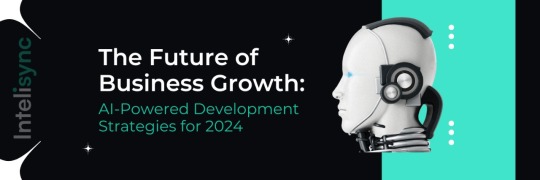
AI-powered development is revolutionizing business growth, efficiency, and innovation. By 2024, businesses that harness AI's potential will achieve unprecedented growth, outpacing their competitors. AI's incorporation into business operations enhances productivity, accuracy, and customer experience, driving revenue growth. McKinsey's report indicates that AI could deliver an additional $13 trillion to the global economy by 2030. With the global AI market expected to grow at a CAGR of 37.3% from 2023 to 2030, AI's role in business is becoming increasingly crucial.
AI-powered development uses advanced technologies like machine learning, natural language processing, and computer vision to perform tasks that typically require human intelligence. AI is transforming industries from finance to healthcare, providing solutions like automated trading systems and predictive diagnostics. AI enhances efficiency by automating repetitive tasks, optimizing operations, and enabling employees to focus on strategic activities. AI-driven chatbots and virtual assistants offer real-time support and personalized interactions, improving customer experience. AI's predictive analytics capabilities provide data-driven insights, helping businesses make informed decisions and stay ahead of market trends.
For businesses to fully leverage AI's benefits, a strategic approach to AI implementation is essential. This includes evaluating goals, identifying data sources, selecting appropriate AI tools, and investing in training and education. Addressing challenges like data privacy, system integration, and ethical considerations is critical for successful AI adoption. Partnering with Intelisync can facilitate this process, providing comprehensive AI services that ensure successful AI integration and maximize business impact. Intelisync's expertise in machine learning, data analytics, and AI-driven automation helps businesses unlock their full potential. Contact Intelisync today to start your AI journey and transform your Learn more....
#AI Development#AI-Powered Development for Businesses#AI-Powered Development: Boosting Business Growth in 2024#Blockchain Development Solution: Intelisync Boost Decision-Making#Boosting Business Growth in 2024#Challenges and Considerations in AI Adoption#Choose the Right AI Tools and Technologies#Evaluate your Goals and Needs#How can AI drive innovation in my business?#How can AI increase efficiency in my business?#How can Intelisync help with AI implementation?#Identify the Right Data Sources#Implementing AI in Your Business Improved Customer Experience#Increased Efficiency Innovation and Competitive Advantage#Intelisync AI Consulting#intelisync ai service Invest in Training and Education#Top 5 Benefits of AI#Top 5 Benefits of AI-Powered Development for Businesses#Understanding AI-Powered Development#Vendor Selection#What is AI Development#What is AI-Powered Development#What is the Future of AI-Powered Development in Business?#intelisync ai development service.
0 notes
Text

on today's episode of "i only pay attention and pretend that i give two shits about the sanctity of human rights when there's a freaking Cheeto in the white house"
“While the administration should be lauded for its efforts to provide children and families access to the court system, its failure to ensure legal representation has produced a massive due process crisis,” said Talia Inlender, Deputy Director of the Center for Immigration Law and Policy (CILP) at the UCLA School of Law. “It should be obvious that immigration court proceedings are far too complex for children to navigate without legal representation, especially when the consequences are so dire. The Biden administration must take swift action to ensure legal representation for all children in immigration court.”
The report’s key findings include:
In a five-month period in FY 2022 alone, almost one third of immigration court cases initiated by the Biden administration–more than 80,000 in all–were against children, over 30,000 of whom were under the age of 5, according to the Transactional Records Access Clearinghouse (TRAC).
Studies show that unrepresented unaccompanied children are at least five times more likely to be ordered removed than children with access to counsel.
By the government’s own account, 44% of unaccompanied children and 51% of families on the Dedicated Docket lack legal representation.
The vast majority of removal orders entered against children are for failure to appear: Approximately 72% of removal orders against families on the Los Angeles and Boston Dedicated Dockets were issued in absentia, with over 48% against children, many under the age of six. Worse yet, 86% of removal orders issued against unaccompanied children were for failure to appear.
Immigration courts under the Biden administration ordered more than 13,000 unaccompanied children removed in absentia between Fiscal Years 2022 and 2023.
The report details how the Biden administration’s treatment of children in immigration court is unlawful, and calls on the Biden administration to: prohibit in absentia removal orders against unrepresented children; terminate the Dedicated Docket; and ensure legal representation for all unrepresented children in removal proceedings.
In handwritten cursive, a Russian immigrant named Marina wrote out the story of the day U.S. Customs and Border Protection agents took away her 1-year-old baby while she was being held in a detention facility in southern California. “I cried and begged, kneeling, not to do this, that this was a mistake, not justice and not right,” she wrote. “She was so little that no one knew anything about her. I was very afraid for her and still am!” This didn’t happen during the Trump administration, which separated more than 4,000 migrant children from their families under its controversial “zero tolerance” policy. Marina was separated from her baby in April of this year. The 40-year-old former restaurant manager came to the U.S.-Mexico border with her husband, mother-in-law and child to seek asylum. More than eight months later, she and her mother-in-law remain in federal immigration custody in Louisiana. Her husband is detained at a different Louisiana immigration facility. And Aleksandra is over a thousand miles away, being cared for by strangers in foster care in California. Aleksandra is one of around 300 children the Biden administration has separated from their parents or legal guardians this year, according to two government sources who asked not to be identified because they hadn’t been authorized to speak about the separations. Most of the cases involved families crossing the southwestern border, the sources said. These numbers haven’t previously been reported. Similarly, 298 children were separated from their parents in 2023, according to a government report to Congress published on Tuesday, even as overall migrant crossings have declined. According to the report, the average amount of time children separated between April 2018 and October 2024 have spent in federal custody before being released to a sponsor is 75 days.
Biden responds to Bernie Sanders' immigration plan: "We shouldn't abolish ICE. We should reform the system. ICE is not the problem. The policies behind ICE are the problem, and that's easy enough to fix if the President knows what he or she is doing."
unfortunately Joe never got around to fixing the Gestapo agency but he tried his gosh darndest and he isn't Drumpf so i guess the pride in being an American was still secure at that point for most liberals. i'm sure that when the next charlatan says the same thing that they'll retain this energy, right? right??
2K notes
·
View notes
Text
🚨Reblog for Awareness!
Hello everyone,
Recently RFK Jr has publicly said that he wants to collect medical data from private insurances (and other agencies and sources) in order to enter the data into a database to track people with Autism. He also mentioned they are creating an Autism Registry where people with Autism's data will be tracked and linked back to the patient they are studying.
With that, this is a HIPPA violation, among other things. I implore you to please reach out to your representatives regarding this. This is a slippery slope. RFK Jr is aiming to find a cure to Autism and identify toxins that cause Autism. In case you didn't already know, Autism is a neurotype and not a disease. It cannot be cured. Many have pointed out that because Autism tends to be genetic that this could turn into a Eugenics problem, as the government is trying to prevent Autistic people from being encouraged to reproduce, and stop Autism altogether. As a result of that, normal people are calling for sterilization of Autistic people, and being fed misinformation regarding Autism and vaccines. RFK Jr is refusing to listen to Autism organizations and advocates, but you can speak up!
Please follow the link below to this Google doc that has email templates to send to your representatives. With your help, we can end this targeted attack on those with Autism and this will ultimately protect your medical data rights and honestly probably avoid things like what happened in the Holocaust as well.
#autism#autistic#autistic things#autistic adult#rfk jr#fuck rfk jr#tumblr politics#us politics#politics#current events#authoritarianism#call to action#tumblr memes#memes#funny#free luigi#free palestine#united states#america#viralpost#lgbtq community#lgbt pride#lgbtq#lgbtqia#transgender#trans pride#trans community#autistic community#signal boost#Kestrel's theory of the world
355 notes
·
View notes
Note
i’m curious what your opinion is on the finer points of the case mentioned in the JSTOR post you reblogged earlier. the two sources in the post say that JSTOR didn’t press charges against him and had already settled with him by the time he killed himself. from what i read on wikipedia, the concern seems to be that JSTOR complied with a subpoena, which i don’t believe they have a choice to ignore? if anything it seems like the us government had reason to want him dead for wikileaks and public court records reasons, so they took a terms of use violation and blew it up into a dozen federal crimes.
is there more context i should be aware of? i have no particular affection or malice for JSTOR but the sources i found don’t exactly implicate the database or its employees in murder.
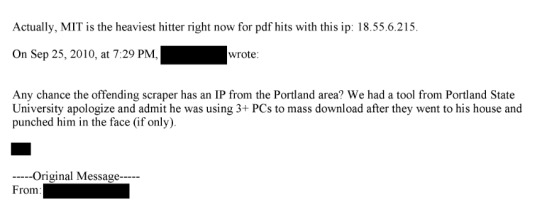


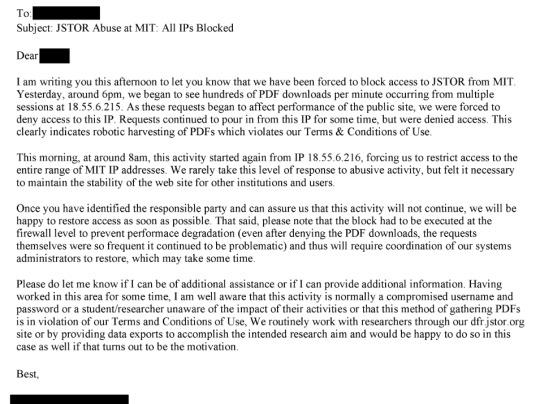
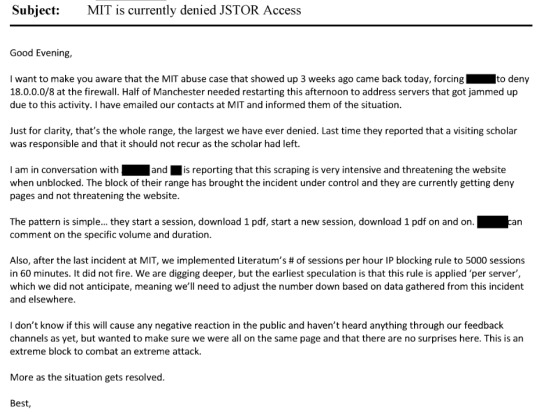
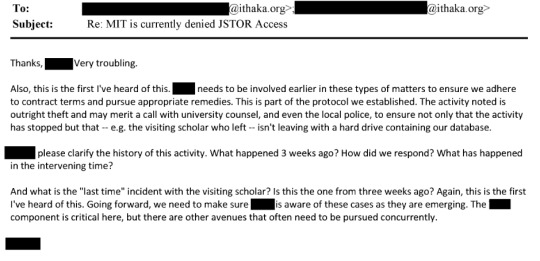
That's from page 175 of this document. This line: "The activity noted is outright theft and may merit a call with university counsel, and even the local police, to ensure not only that the activity has stopped but that - e.g. the visiting scholar who left - isn't leaving with a hard drive containing our database" is where I think the culpability starts.
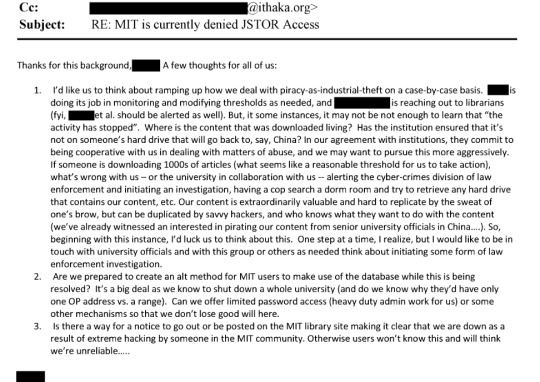
If someone is downloading 1000s of articles (what seems like reasonable threshold for us to take action), what's wrong with us - or the university in collaboration with us - alerting the cyber-crimes division of law enforcement and initiating an investigation, having cop search dorm room and try to retrieve any hard drive that contains our content, etc. Our content is extraordinarily valuable and hard to replicate by the sweat of one's brow, but can be duplicated by savvy hackers and who knows what they want to do with the content?
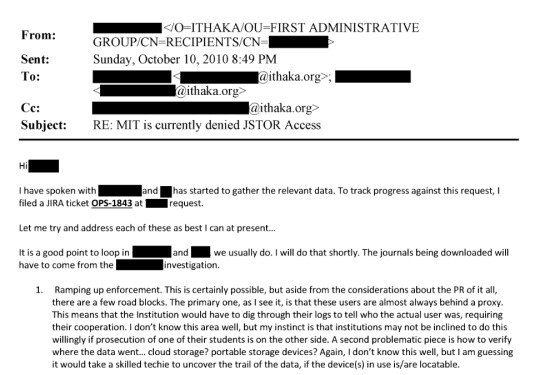
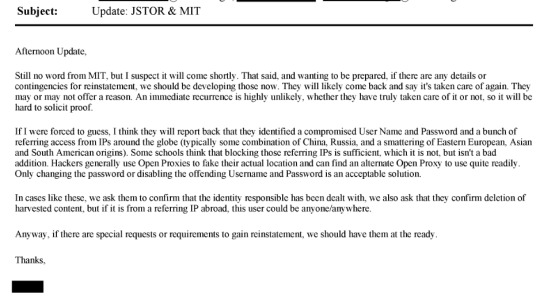
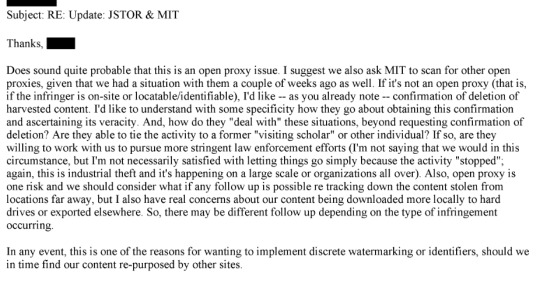
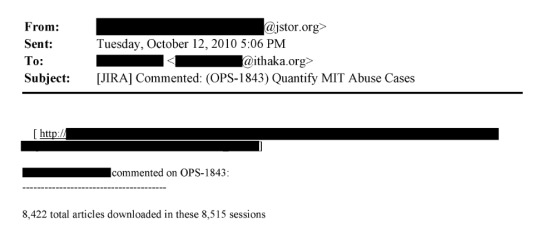
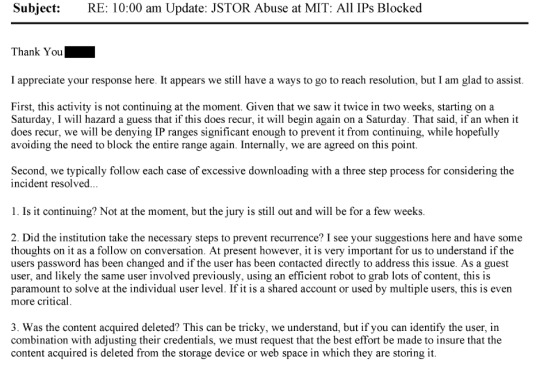
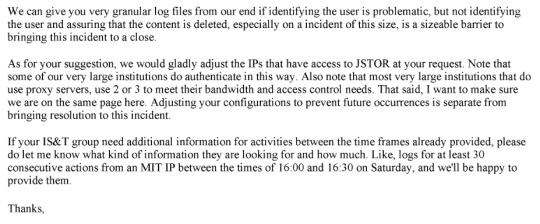
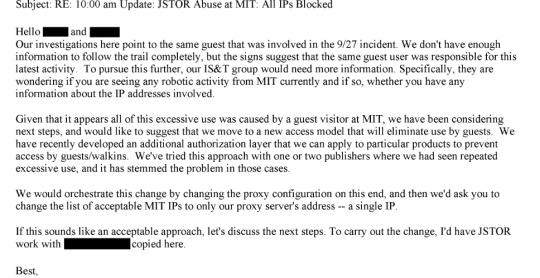
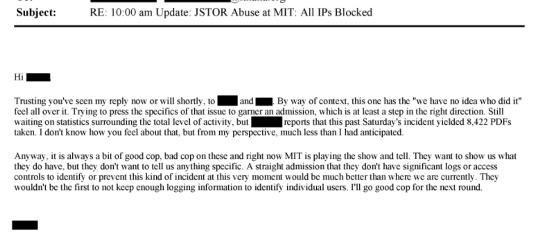
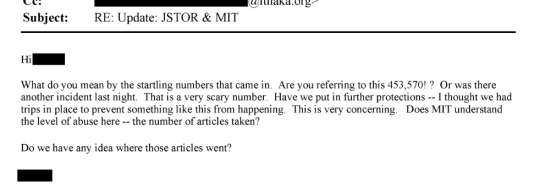

Page 379: "Does the university contact law enforcement? Would they be willing to do so in this instance?
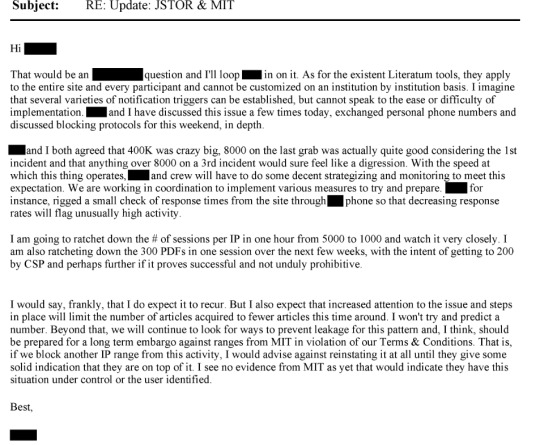


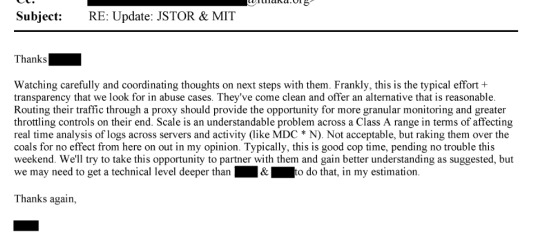
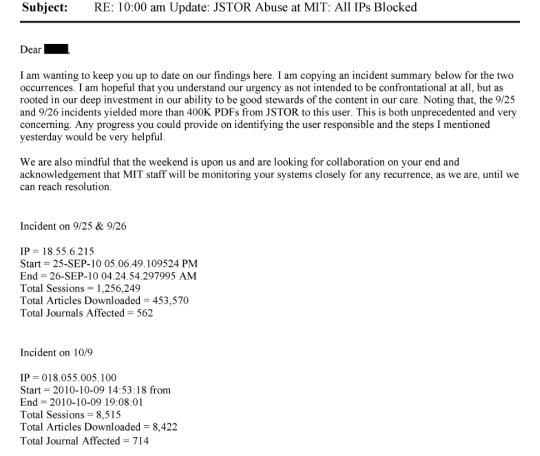
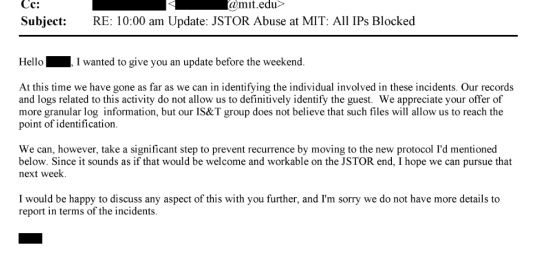
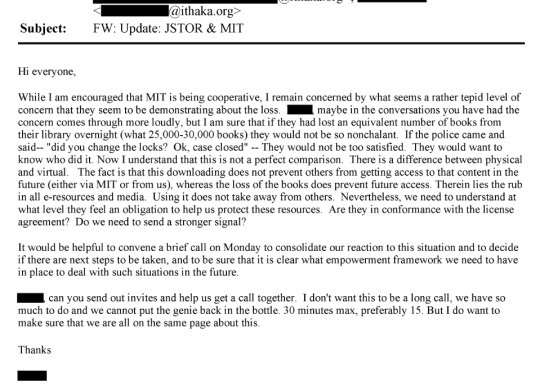
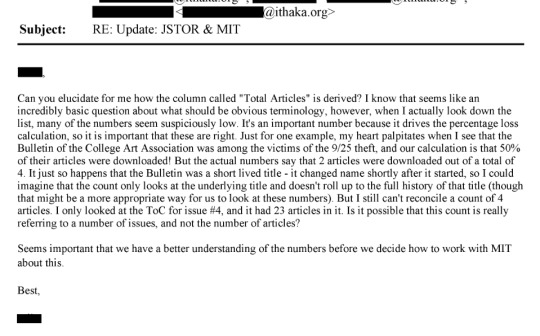
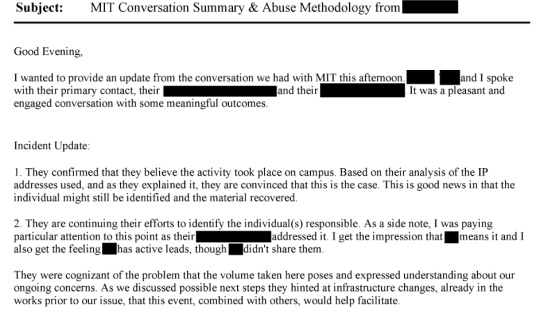
From page 1296:

I think the important thing to note here is that JSTOR had worked with MIT and had plans in place to prevent future similar downloads, but remained focused on identifying the person responsible for the downloads and ensuring that their data was deleted.

"I might just be irked because I am up dealing with this person on a Sunday night, but I am starting to feel like they need to get a hold of this situation right away or we need to offer to send them some help (read FBI).
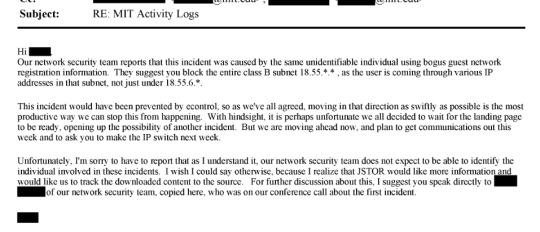
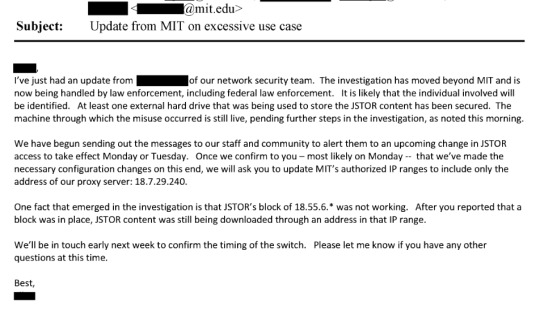
And there it is. Page 3093 of the document.
JSTOR can hem and haw about it all they want, but you can't un-call the cops.
MIT was working with JSTOR on preventing future incidents of pirating, but JSTOR repeatedly said that they weren't going to let it go, that it was unacceptable to drop the issue, that they were going to continue to pursue the pirate.
You can scroll through the document and see the JSTOR tech department and abuse team talking about Swartz as a script kiddie, and a hacker. You can see someone talking about how this was real theft - making the comparison to stealing books even while admitting that piracy doesn't close others out of access.
You can see the thread starts with a joke about punching someone in the face for hacking their system, and includes the tech team ominously considering whether they should threaten the MIT librarians with the FBI.
There's something really important to note here which I don't think that people who aren't PRETTY DEEP into hackery shit aren't aware of: US law enforcement is absolutely rabidly feral about prosecuting hackers. People may be more aware of this now because of Chelsea Manning and Edward Snowden (and perhaps a bit on tumblr because of maia arson crimew), but people who work in tech and who are in infosec - like the people joking about calling the FBI in these emails - would be aware of the bonkers disproportionate punishments faced by hackers. And knowing that, they kept pushing and pushing and pushing for identification of the hacker. They kept digging with MIT, they kept saying that simply preventing future incidents wasn't enough.
Early in the exchange someone from JSTOR asked "what's wrong with us - or the university in collaboration with us - alerting the cyber-crimes division of law enforcement and initiating an investigation, having cop search dorm room and try to retrieve any hard drive that contains our content, etc." and the answer is what happened to Aaron Swartz.
It is absolute bullshit for JSTOR to say "we arrived at a solution privately and didn't want to press charges" after law enforcement has gotten involved with a hacking case, especially one where they're talking about "real theft" and are attempting to quantify and emphasize the amount that was "stolen" from them.
The *public* may believe that private individuals or institutions are the ones who "press charges" but that's simply not the case. It's prosecutors who decide whether or not to go ahead with charges; they do it based on what cases they think they can win and what their office's perspective is on the crime. When you hear about people choosing to press charges it simply means that they decided to tell the prosecutor they wanted the case to go forward. It's up to the prosecutor whether or not that happens.
And the tech team at JSTOR had to know that law enforcement wasn't just going to wag a finger at an academic hacker.
There's a parallel here that happens sometimes when people have their identities stolen by their parents. If you mom takes out a credit card in your name, that's identity theft. That's fraud. That's illegal. If you reach the age of 25 and realize that your credit is ruined because your mom has been defaulting on cards in your name, you've got two choices to fix that: one is to accept the debt and pay it off and build up credit, and the other is to report the identity theft - which will end up with your mom in prison for a decade or so. Ruin your own personal finances, or your mom goes to jail for ruining your finances. So if you find out that your mom stole your identity you can't just call the cops to pressure her into transferring the debt to her name or something. That's not an option. The cops are not a threat to wave over people, they are not a way to get people to fall in line or act right. They aren't someone you can send to a college student's dorm room to retrieve a hard drive and have the matter drop.
When you call the cops on someone you are sending the full force of the law after them, and the full force of the law falls really heavily on hackers, and how heavy that blow can be is something that the JSTOR team must have been aware of when they were making snide comments about calling the FBI because they were frustrated with the noncommittal responses they were getting from librarians.
Ultimately it was the carceral state that killed Aaron Swartz, but they would not have been involved if JSTOR didn't think that what he did constituted theft.
Taking an *EVEN LARGER* step back from that, the idea that information can be owned and locked behind a paywall is what killed Aaron Swartz, someone who fought for information to be free.
Like. JSTOR is a licensing company. At the end of the day, cute social media posts and all, they're the same as the RIAA and ASCAB. They exist to extract a fee from people attempting to access information.
Aaron Swartz and all that he stood for are an existential threat to their core function.
Are JSTOR's hands as dirty as the federal prosecutors? Absolutely not. But they operate on a model that puts them in opposition to open information activists and it ended up with a hammer falling on Aaron Swartz that they dropped.
2K notes
·
View notes
Note
how do i know what’s right?
i feel like i have zero critical thinking skills ;-;
a lot of the time when someone poses an idea or a theory they think they’re right, and so they use language that enforces that. but then someone refutes it, and uses language affirming what they believe and i see the point in their argument. and then it gets refuted again and again and again and im just confused.
hi great question. i would love it if there were a single easy litmus test to figure out who's 'right' and whose info i should trust! unfortunately things are rarely this easy, and it's actually completely normal to be overwhelmed by the amount of information being produced and shared, especially when it comes to topics you haven't researched/lived/etc. for most of us, this will be most topics!
i'd preface this by saying that i think your overall attitude here is actually a good one. you're framing it in a pretty self-deprecating way—but actually, imo this type of openness to discussion and disagreement is a really good place to start, esp when dealing with topics that are new to you. nobody enters a contentious debate with a fully fledged, defensible viewpoint. you might feel like you're just treading water here, making no progress toward being able to evaluate arguments for yourself, but i highly doubt that's true.
all of that said: while i again cannot give you a single litmus test for figuring out what's 'right', there are four pretty basic sets of questions that i automatically run through when encountering a new idea, source, topic, or argument: we can call these origin, purpose, value, and limitations.
origin: who's the author? do they have any institutional affiliations? who pays their salary? is this argument or paper funded in any way? is the argument dependent upon the author's social position or status (race, class, etc) and if so, are those factors being discussed clearly? does the author have ties to a particular nation-state or stakes in defending such a nation-state? what's the class character of the author and the argument? what's the social, economic, and intellectual context that gave rise to this argument or source?
purpose: why is this source or person disseminating this information or making this argument? are they trying to sell you anything? are their funders? are they trying to persuade you of a particular political viewpoint? keeping in mind the answers to the 'origin' questions, are there particular ideological positions you would expect to find in this source or argument, and are they present? what are the stakes for the author or source? what about for those who cite the source or further disseminate or publish it?
value: what does this source or argument accomplish well? what aspects of the argument are new to you and strike you as insightful? are there linkages being made that you haven't encountered elsewhere, and that you think are effectively and sufficiently defended? are there statistics or empirical data that might be useful to you in forming your own argument, even if you disagree with how this source or author is interpreting them? what does this argument or source tell you about the types of debates being had, and the rules of those debates?
limitations: where does this argument or source fail you or fall apart? are there obvious rhetorical fallacies you can identify? is the author forgetting or overlooking some piece of information that you know of from elsewhere? which viewpoints may be omitted? keeping in mind the answers to the 'purpose' questions, if this source is defending a particular ideology or political position, is that one you agree with? is it only defensible so long as the author omits or distorts certain pieces of information? are there points where the argument jumps from evidence to a conclusion that the evidence can't fully support? are there alternative explanations for the evidence?
over time you will often find that it becomes more and more automatic to ask yourself these questions. you will also find that the more you read/hear about a particular topic, the faster you can determine whether someone is presenting all of the evidence, presenting it fairly, and using it to fully defend the argument they ultimately want to make. and you will probably also find that at some point, you're able to synthesise your own argument by pulling the strong parts from multiple other people's viewpoints, combining them with your own thinking, and fitting them together in a way that adequately explains and materially analyses the issue at hand.
#sry if this feels kind of abstract lol fight between specificity and applicability#lit and literacy
2K notes
·
View notes
Text
“Treasury has been denying that they gave Marko write access, but I am looking at his access request right now”
So they have “read and write” access, or even “read only” access, why do we care? What are the possible consequences?
1. Musk, Trump and their respective cronies have unrestricted access to your social security numbers, your confidential bank information, your confidential medical information and so much more.
This is true with just “read only” access. This is why the burgeoning media war (that currently “read only” is winning unfortunately) is something of a red-herring. It matters, don’t get me wrong. As a source yesterday said, Apocalyptic. But that source also said that “read only” was “catastrophic”. If the smash and grab operation commences just as stupidly, quickly and dangerously as it has so far, this could easily become identity theft by an untold number of people using their personally identifiable information within weeks.
This kind of information can also be used to target enemies and, if they get operational control elsewhere, the capability of using the Anti-Money Laundering (AML), Know Your Customer (KYC), & the Combating the Finance of Terror (CFT) laws to target political enemies. Of course, these laws have already been used to target political dissidents; but we are talking about something of an incomprehensibly larger scale. As one long time payments lawyer wrote to me: “Is DOGE using its own, non-OFAC definition of ‘terrorist group’ that has no basis in law?” In this sense, the Democratic party has fully and unequivocally participated in building the apparatus that is showing to be extraordinarily easily weaponized against them. In short, they can not just steal money but eliminate the financial existence of anyone they felt like, if operational control gets sufficient. The week Trump won his second term, I told a room full of Democratic party operatives that “if the Democratic Party really believed Trump was a fascist, they would destroy the servers containing all the surveillance data.”
2. Creating “backdoors” into the Treasury’s multi-trillion dollar payment system
I’m running short on time (it's late at the time of writing) and I have to get up in the morning and be prepared for another round of intensive interviews so this will have to be more carefully detailed in the future. But these are extremely sensitive systems, and complicated systems. All the factors that slow them down in taking over the system are also the factors that would make it hard to find intentionally hidden code to their benefit that could give them ongoing access to the system even if they are removed. I need to do more reporting on this one but it is something many, many sources have mentioned
3. Subordinate the judicial system to the Trump Administration/DOGE
This one has been hard to get across to readers. As you can imagine, the overwhelming social media response to this reporting has focused on the absurd illegality of the actions. Asking for judicial intervention. But as I covered in my piece Friday, the constitution is not self enforcing and the supreme court is unlikely to step in, or to step in a positive way. In my Friday’s piece I unfortunately presciently asked:
As a famous twentieth century statesman might have said in this situation "...and how many divisions does the Constitution have?”
What happens if they are just embedded so deeply in the heart of government payments that there is no mechanism to dislodge them? Court Injunctions are not self enforcing either My longtime payments lawyer source agrees with this point, which I also tried to articulate Monday:
Chokehold to stop or delay any and all payments initiated by federal agencies, and potential mechanical method to thwart judicial rulings when a judge/court says “You as the Executive Branch cannot stop federal grants/payments lawfully approved and directed by Congress.”
As we’ve seen, there are no armed law enforcement figures coming in to save the day and if Musk's DOGE get deep enough into the Bureau of the Fiscal Service, the only way to enforce the law is through street actions.
4. Elon Musk can use this system against his enemies.
It almost feels quant to say because the timeline of so many of the other possibilities are so immediately and dramatically dire that this one almost feels hopeful in comparison in that it implies “competitive position” being something that is very meaningful. Nevertheless, it should be obvious that this information, which includes information on all businesses the Federal Government does business with, is ripe to be used to kneecap competitors. Specifically my longtime payments lawyer source brought up just outright putting competitors on the “do not pay” list. The “good case scenario” may just be an economy increasingly dominated in all corners by Musk and/or Trump through a sprawling network of business ventures with the greatest possible advantages.
5. The New American Payments System, X the Everything App
For this one I am just going to quote my longtime payments lawyer source at length. They’ve got it and note this is a “read only” issue. Imagine the worst case of paying your taxes on X payments, or “receiving” your social security payments there.:
Obtaining access to and potentially exfiltrating data sets from BFS that may be characterized as “anonymized” (in order to evade criticism about potential violation of privacy laws), but could give insight into payment patterns and payment system strengths, weaknesses and behaviors:
1. Such information obtained on an inside track by DOGE would be very helpful, for example, if you are an entity like X Payments LLC and are currently licensed as a money transmitter in 42 states with plans to launch as-yet-to-be specified payments and financial services.
2. It is unclear whether there are any limitations on DOGE personnel transferring payment information to X Payments LLC in order for that company to gain proprietary information regarding federal payments in an anti-competitive manner compared to its fintech competitors currently in the marketplace.
3. Such single-sourced information not available to other market competitors would provide an anti-competitive jump for X Payments LLC on ApplePay, Google Pay, Samsung Pay (mobile wallets) and a host of other fintech companies in the marketplace backed by venture capital and private equity funding.
6. Ability to pick and choose who gets public money, regardless of congressional directives
I covered the constitutional aspects of this crisis Friday. The payment aspects I covered Monday. Without Judicial ability or willingness to sanction Trump & Musk, There is very little left of congress. The “power of the purse” is central to the rule and authority of congress. The decentralized (in relative terms) nature of administrative agencies means that there are enormous opportunities for agencies to follow the law. This is a place to skip past all those headaches.
7. Subordinate the judicial system to the Trump Administration/DOGE
This one has been hard to get across to readers. As you can imagine, the overwhelming social media response to this reporting has focused on the absurd illegality of the actions. Asking for judicial intervention. But as I covered in my piece Friday, the constitution is not self enforcing and the supreme court is unlikely to step in, or to step in a positive way. In my Friday’s piece I unfortunately presciently asked:
As a famous twentieth century statesman might have said in this situation "...and how many divisions does the Constitution have?”
What happens if they are just embedded so deeply in the heart of government payments that there is no mechanism to dislodge them? Court Injunctions are not self enforcing either My longtime payments lawyer source agrees with this point, which I also tried to articulate Monday:
Chokehold to stop or delay any and all payments initiated by federal agencies, and potential mechanical method to thwart judicial rulings when a judge/court says “You as the Executive Branch cannot stop federal grants/payments lawfully approved and directed by Congress.”
As we’ve seen, there are no armed law enforcement figures coming in to save the day and if Musk's DOGE get deep enough into the Bureau of the Fiscal Service, the only way to enforce the law is through street actions.
8. Elon Musk can use this system against his enemies.
It almost feels quant to say because the timeline of so many of the other possibilities are so immediately and dramatically dire that this one almost feels hopeful in comparison in that it implies “competitive position” being something that is very meaningful. Nevertheless, it should be obvious that this information, which includes information on all businesses the Federal Government does business with, is ripe to be used to kneecap competitors. Specifically my longtime payments lawyer source brought up just outright putting competitors on the “do not pay” list. The “good case scenario” may just be an economy increasingly dominated in all corners by Musk and/or Trump through a sprawling network of business ventures with the greatest possible advantages.
9. The New American Payments System, X the Everything App
For this one I am just going to quote my longtime payments lawyer source at length. They’ve got it and note this is a “read only” issue. Imagine the worst case of paying your taxes on X payments, or “receiving” your social security payments there.:
Obtaining access to and potentially exfiltrating data sets from BFS that may be characterized as “anonymized” (in order to evade criticism about potential violation of privacy laws), but could give insight into payment patterns and payment system strengths, weaknesses and behaviors:
1. Such information obtained on an inside track by DOGE would be very helpful, for example, if you are an entity like X Payments LLC and are currently licensed as a money transmitter in 42 states with plans to launch as-yet-to-be specified payments and financial services.
2. It is unclear whether there are any limitations on DOGE personnel transferring payment information to X Payments LLC in order for that company to gain proprietary information regarding federal payments in an anti-competitive manner compared to its fintech competitors currently in the marketplace.
3. Such single-sourced information not available to other market competitors would provide an anti-competitive jump for X Payments LLC on ApplePay, Google Pay, Samsung Pay (mobile wallets) and a host of other fintech companies in the marketplace backed by venture capital and private equity funding.
10. Ability to pick and choose who gets public money, regardless of congressional directives
I covered the constitutional aspects of this crisis Friday. The payment aspects I covered Monday. Without Judicial ability or willingness to sanction Trump & Musk, There is very little left of congress. The “power of the purse” is central to the rule and authority of congress. The decentralized (in relative terms) nature of administrative agencies means that there are enormous opportunities for agencies to follow the law. This is a place to skip past all those headaches.
11. Catastrophic failure of the payments system.
Even a disruption for a day would be a disaster. A disruption on longer timescales would have unimaginable knock on effects. The Treasury could involuntarily default because of operational issues. The worst case scenarios, which are completely and utterly plausible at the time of writing, would be a catastrophe without precedent. No typical economic calamity like the Great Financial Crisis or even the Great Depression would be comparable.
87 notes
·
View notes
Text
How to write good dialogue
Almost every story needs dialogue - obvious right? Well, this post is about the not-so-obvious sides of conversations. I've struggled a LOT with snappy and realistic speech, so I've made it my mission to collect some handy directives. Here is what I found:
Contents
Information Dumps
Setup And Payoff
Characterization Through Dialogue
Three Simple Questions
Four-Sides Model
Depth
About Answers
Sources And Credits
⮮ Let's go! (^▽^) ⮯
Information Dumps
Everybody knows them, everybody hates reading them. But how do we avoid them? Something really clicked for me when I understood context. If your character talks about something that happened in the past, they don't need to explain what happened. They were there. Here's an example:
"It would be nice if we at least got a B for that paper. Since I will go to college next year, I feel that this is important to me."
The speaker and the listener should be aware of the exposition (regarding their last year at high school). During dialogue, these conditions go without saying.
Setup And Payoff
Instead of dumping everything at once, let the reader guess what's happening. This is done by mentioning something that is not answered right away. Also dropping hints can increase tension.
Scene 1 "Why do you always carry that with you?" she asked and pointed at the box cutter. Her friend eyed her with suspicion. "For cutting." "Yeah, but why?" "Might come in handy sometime." Scene 2 An ice cold shiver ran down her spine as her fingers felt around the bag, searching for the familiar shape. There was nothing. The other tossed the thing onto the floor between them. "Care to elaborate?" She couldn't have known. "How could you!"
Someone definitely has a secret here that they don't want uncovered. It makes the reader speculate: Does she carry the knife to defend herself or does she plan on hurting someone with it?
Characterization Through Dialogue
The general rule of thumb is: Show not tell. If a character is shy, self-absorbed or chaotic, make them act like it. Also, readers take part in the characterization of your protagonists. Make them guess why a character acts a certain way.
"C- can I have your pen?" She twirled her thumbs and looked at the ground. "What the hell, no!" Disgusted, he brushed off his hands on the front of his jeans. "I'mma better disinfect that."
Notice how the girl is stuttering and the boy has a loose tongue. Mannerisms help identifying traits in a character. Everyone has a distinct way to speak (e.g. relaxed, polite, malignly) which makes it easier to tell them apart. Sometimes there is a difference between speech and behavior. This can be quite useful to highlight conflict inside a character.
Three Simple Questions
Who wants what from who?
Why now?
What happens if they don't get it?
These questions ensure plot consistency. For question 3 the only other outcome is conflict. Conversations thrive off of conflict and it is of benefit to have a supplicant and potential provider for a solution. It's basically intention versus obstacle.
1. She wants to be his wife. He doesn't want a marriage. 2. She is pregnant. 3. She needs to provide for a baby all on her own.
Tadaa, a conflict ensues.
Four-Sides Model
The four-sides model is a theory on communication. It assumes that a message has four distinct ways of being conveyed:
Facts -> data, facts, truth and relevance
Self-Disclosure -> explicit and implicit information about the own mindset; likes, dislikes, opinions
Relationship -> information about whether the person is liked or detested; approval and disapproval; "I assume you have [this] opinion of me"; body language
Want -> a direct attempt to influence the behavior of another person; advice, desire or instruction
Since this is highly technical stuff, I'll provide you with an example:
Customer: "I always drink my coffee black." 1. Fact: The coffee I drink is black. 2. Self-Disclosure: I like black coffee. 3. Relationship (POV of the waiter): Did I do something wrong? OR It's their fault! They ordered the wrong thing! 4. Want: Bring me black coffee.
Controlling the message through sender and receiver gives a new level of influence to an author. The relationship-level is the bottleneck in a conversation that holds the most potential for misunderstandings. I'm trying to be aware of it when I write subtext (see below).
Depth
On the nose dialogue is what we want to avoid at all costs. For this reason subtext is created in stories. Read this:
Scene 1 A: "I like you." B: "Nah, I don't like you back. You're so annoying." A: "Ouch, that hurts. I'm not sure if I heard that right." B: "We were never friends. Go away."
This is not how conversations work. Thankfully, dialogue like this is not entirely useless. It conveys what the characters really want to say. The challenge is to think of a way to not say the thing but keep a similar meaning.
The true meaning behind the dialogue is called subtext (scene 1). If I don't know how to continue after a certain line, I write down the subtext first before I decide on how to paraphrase it.
Finally, I add a fitting description of expression and body language if needed. I try to keep it short and simple.
Check this out:
Scene 2 She tucked her hair behind her ear. "I need a ride home later. Are you free?" -> I like you. "Sorry, all seats' re taken," he said without looking at her. -> Nah, I don't like you back. You're so annoying. "Uhm, okay. But I'm small. You could fit me in the footwell, honestly." -> Ouch, that hurts. I'm not sure if I heard that right. He leaned forward as if he had the urge to stand. "Ha, funny. But no, I'm not planning on doing something illegal tonight." -> We were never friends. Go away.
A character's action depends on their own intention and the other's response. I feel it is easier to keep track of what's happening behind the curtains when it's written alongside the dialogue.
Simultaneously, you can keep habits and traits in check. Does the the character apply all criticism to themselves? Are they disregarding or constantly marginalizing others? Do they worry only for themselves or solely for others? Subtext truly is the most powerful tool in conversation-writing.
About Answers
Did you know that you don't have to answer every single question? In fact, there are two other ways to show an emotion without telling it.
The first one is called sidestepping. The character ignores the posed question and carries on with an entirely different topic.
A: "Do you still love me?" B: "We should get going."
It's very obvious, right? By sidestepping the question, we can assume that the character is uncomfortable or angry with the other person.
The other way to answer is actually a bit paradoxical. Through silence, a great variety of emotions can be displayed. It is recommended to refrain from actually describing silence with words like "he remained silent", "he refused to say anything", "he never responded".
- The laptop hummed. - The birds chirped in the trees. - She felt her legs going numb from sitting in an uncomfortable position. - His eyes wandered around, searching the parking lot for a familiar face.
It feels more natural to explain the things that grab our attention when we sit in silence.
This is it, folks. That's all I could find on the topic - for now. If there's anything missing, I'd love to hear it.
‧͙⁺˚*・༓☾ Anyway, thanks for reading, I hope this helped ☽༓・*˚⁺‧͙
My sources are this and this video as well as this article.
Also a big thank you to @zoropookie for helping me with the colors ⸜(。˃ ᵕ ˂ )⸝♡
217 notes
·
View notes
Text
Also preserved in our archive (Check in for daily updates!)
By Julia Moore Vogel and Charlie McCone
Almost five years since the pandemic began, there is not a single FDA-approved treatment
Imagine, for a moment, that you wake up one morning with a debilitating illness that won’t let go. Weeks and months pass, but the crushing fatigue, constant headaches, and aching muscles remain. You can’t think straight. Simply showering or doing the dishes leaves you floored for days at a time, and the unpredictable symptoms — shortness of breath, dizziness, a racing heart — ebb and flow without warning. You find your life as you knew it slipping away.
This is life with long Covid: a condition that transforms the familiar rhythms of daily life into a living nightmare and constant battle for energy and clarity. But what happens when the only hope of lessening its severity becomes an issue of equity?
We are two of the more than 400 million people worldwide who have experienced long Covid. While we are both over four years into this illness, there is still not a single FDA-approved treatment for this devastating condition. Given the slow pace of research and development, there is unlikely to be proven treatment for years — possibly decades.
For people with long Covid, finding some relief today rests in accessing promising medications that are already on the market. One of us, Charlie, received Plavix that was prescribed off-label and has since substantially improved his quality of life. He still remains mostly housebound, but the drug relieved two years of constant agony of not being able to take a normal breath. Blood thinners including Plavix have been shown to reduce long Covid symptoms, possibly because they reduce microclots and hyperactive platelets found in patients. However, many physicians are wary of prescribing them due to bleeding risks. We are not suggesting that Plavix will be right for everyone with long Covid — we share this experience as an example.
But there is a significant downside to this approach: Combing through countless resources and identifying potential treatment options requires money, educational attainment, and health insurance — as well as time, energy, and cognitive capacity, three things that are in short supply when you have long Covid. Even then, you must be able to meet with several physicians to find an informed and willing provider. If any one of these pieces is missing, people with long Covid are likely to be left without adequate care, particularly if they also face the barriers of racial, ethnic and gender medical bias. This is yet another example of the already glaring health disparities in the U.S. The result is a health care system that continues to fail and harm the millions of people with long Covid, who must experiment on their own to manage their condition.
From personal experience, receiving an off-label drug required meeting with dozens of health care providers, including one along the way who said, “99% physicians would never prescribe it” due to concerns about its side effects. It took a total of 18 months to find a willing prescriber, and it was the only drug to alleviate the debilitating symptom of shortness of breath.
This is just one treatment among an entire portfolio of promising FDA-approved medications that we and others at the Patient Led Research Collaborative are working to collate, which includes well-known medications like low-dose naltrexone. These medications can be prescribed off-label and have provided some relief to people with long Covid. The evidence base for these treatments largely comes from the extensive literature on infection-associated chronic conditions as well as recent long Covid case studies and crowdsourced data through sources like CureID, Long COVID PharmD’s surveys, and support groups such as communities on Reddit.
Out of desperation, patients are using their limited energy to individually repeat the same web searches and reviews of the literature, then attempting to convince their physicians to prescribe treatments. Many physicians are uncomfortable prescribing off-label medications for long Covid even though one in five prescriptions in the U.S. is written for off-label use. The medical and research communities should be bringing treatment options, along with an assessment of their risks and benefits, to the patients. A national registry collecting data on current off-label drug use to treat long Covid could cost-effectively generate urgently needed safety and efficacy data.
To lessen the burden of long Covid on people with the condition, we need to get more information into the hands of physicians, while giving patients more decision-making authority. For example, there are high-quality guidelines for diagnosing and managing ME/CFS and POTS, at least one of which most people with long Covid have, yet medical gaslighting continues to run rampant and most medical schools do not educate physicians about these conditions.
Health care systems should also expand access to survey-based prescriptions for drugs that already have strong safety profiles. Multiple companies offer access to prescriptions after brief patient interactions, but they are generally not covered by insurance, are only available in some states, and do not always include sufficient information about risks or support for addressing side effects. Further, the federal government must create pathways and incentives for drug repurposing with public health benefits.
Finally, all patients must be informed by their health care providers about treatment options and their risks and benefits, as well as adequately supported in cases where side effects occur.
Ultimately, finding cures requires many more high-quality clinical trials, and we desperately need “moonshot” funding to get us there. But in the short term there is so much more the health care system could be doing to provide meaningful care: We call upon the Department of Health and Human Services to find ways to approve, pay for, and collect and disseminate information about treatment options for long Covid and other infection-associated chronic conditions.
We all prefer making decisions based on gold-standard clinical trials, but if we do nothing while we wait for that data to be generated, people with long Covid will continue to experience debilitating symptoms, loss of income, homelessness, and death. Further, in the absence of guidance, people with long Covid will continue to self-manage their condition, investing in costly treatments and unregulated supplements.
With the support of the health care system, they would have much more comprehensive, readily available information on the risks these treatments might pose — including that certain treatments may help only a subset of people who try them. Patients have the right to make well-informed decisions about accessing promising drugs with reasonable safety profiles.
Without treatment, 400 million people worldwide could suffer indefinitely. “Do no harm” means providing access to treatments — not withholding them.
Julia Moore Vogel, Ph.D., MBA, is a long Covid patient-researcher at Scripps Research and the Patient Led Research Collaborative (PLRC). Charlie McCone is a long Covid patient advocate, is a member of the PLRC, and has served as a patient representative on the NIH RECOVER clinical trials arm.
#mask up#covid#wear a mask#pandemic#public health#covid 19#wear a respirator#still coviding#coronavirus#sars cov 2#long covid#covid conscious#covid is airborne#covid is not over
56 notes
·
View notes
Note
You are the most trusted source for any Sonic stuff I know, so I'm gonna ask:
What do you think of the new Sonic leaks relating the apparent return of the Freedom Fighters???
So, for context, for everyone else reading this that doesn't know:
Rovio is testing a new Sonic mobile game called Sonic Blitz, which is basically a Sonic-flavored version of Marvel Snap. It is currently only available in the Philippines right now, which is what is known as a "soft launch." They are testing the game in one location before considering a world-wide release.
That hasn't stopped people from digging into the game files, where they've discovered unreleased card sets that cover... literally every corner of the Sonic franchise. The first sighting of Ray the Flying Squirrel since Sonic Mania, for instance. Classic Mighty the Armadillo... and Modern Mighty the Armadillo, aka a version of the character we've never seen before. There are also incredibly deep cuts, like members of the Battle Kukku Army and even Norm from Sonic Rush Adventure, a character I could not identify if you asked me about him. There's even a card for Honey the Cat.
But, more interestingly, is that there are even cards for things that are normally forbidden. There's card data for Lyric. There's card data for Sonia and Manic. There's even card data for Princess Sally, Antoine, Bunnie Rabbot, and Nicole. A lot of these characters have been blacklisted from modern Sonic appearances for various reasons.
So for them to show up in this Sonic Blitz thing is... unexpected. And these don't seem to be hoaxes; multiple people have confirmed these are things in the files right now, even if they haven't found a way to access them in game yet.
I think a lot of them are probably Rovio just filling out the card database with whatever they could find and Sega hasn't necessarily approved each and every card in the data right now. Even if some cards are more done than others -- apparently Antoine and Bunnie have specific team attacks already, for instance (they were husband and wife by the end of the Archie comics).
I would not hold my breath about any of them ever actually making it into a worldwide release of the game, but I'd love to be proven wrong. Sega has wanted to cash in on the multiverse fad without actually embracing a multiverse. So we end up with something like Sonic Prime, with its off-brand alternate universes, or Sonic Racing Crossworlds, where we're apparently getting a bunch of Nickelodeon DLC.
One of the biggest, most shocking, most exciting swings Sega could take with the Sonic franchise right now would be to officially bring this stuff back into the fold somehow. To stop getting people's hopes up for something and then not doing it.
But Ian Flynn has apparently been fighting for this internally from the moment the IDW book started, so unless they've suddenly made a breakthrough recently, I wouldn't get my hopes up.
#questions#eltecnopata#sonic the hedgehog#sega#sonic team#archie sonic#sonic blitz#sally acorn#princess sally#sonic prime#sonic racing crossworlds
24 notes
·
View notes
Note
Ik this isnt a data based question, but what are the main theories on patriarchy’s origin? There’s the marxist feminist one where agriculture was the main instigator, but most hunter-gatherer societies are not completely feminist and gender equal either. Is it a matter of physical strength + motive + opportunity for men? I was just wondering what you thought about the literature on this topic (of course much of it is purely speculative).
Hey! Okay, so I want to start this out by acknowledging that history is not my field. I am in awe of historians because they're essentially making coherent theories out of a patchwork of surviving evidence. Add to that the language barriers (so many modern languages! exponentially more extinct languages!) and the fact that people just lie (in translations! about primary sources! in! primary! sources! I cannot fathom having to figure out whether or not a primary source is reliable or not because Ancient Guy #24232 lies – but only sometimes) and I am amazed the field is as coherent as it is.
(Yes I am aware many of these things apply to both "hard" and "soft" sciences. The difference is I know how to identify the problems in the sciences :'))
So, with that disclaimer, here is some information! (All sources at the end, this time!)
---
The theories:
I found a bunch of different theories about the patriarchy's origins, but it's unclear to me the extent to where these fall on the "vague possibilities" to "generally accepted as fact" scale. They include:
Agriculture: The theory that the invention of agriculture led to permanent human settlements, at which point hierarchies including the patriarchy emerged. Often connected to the ideas of land rights and defense of land rights (warfare) and the ideas of property rights and inheritance of property (i.e., male control over resources and/or the treatment of women as property).
Fire: A similar theory as the agriculture theory, but centered around the invention of fire. Connected to the idea that the movement of women started being restricted around the time fire/cooking was invented (i.e., that women "stayed at/close to camp" to cook while men left to hunt).
Mobility: A theory emphasizing the differences in freedom of movement (i.e., that the division of men hunting and women gathering). Connected to the invention of fire and agriculture, both of which likely restricted women's movement further than before.
Reproductive capacity: The theory that the differential amounts of investment in reproduction (i.e., men need to ejaculate sperm and women must grow the child, give birth, and nurse the child until weaned) resulted in the patriarchy. Sometimes linked to Marxist feminism, by the suggestion that men regard and treat women as a "means of (re)production". Either way, this theory emphasizes the exploitation of women as a resource.
Physical dimorphism: Linked to the reproductive capacity theory but focused more on other physical differences (e.g., men tend to have greater absolute strength, be physically larger, etc.). Focuses on the fact that men have the physical capacity to assault and control women. Often supported with comparisons to other mammals.
Choice: The theory that men (or some men or multiple groups of men) intentionally started the patriarchy to obtain individual benefits and have since (intentionally and/or passively) perpetuated it out of a desire to maintain those benefits.
Others: Some people may divide out theories in different ways. For example, some may contend that the patriarchy followed the invention of a private property/a class system, in which men controlled these resources. (I have lumped this in with agriculture.) There are likely other theories I am unaware of!
Poking holes in these theories:
All of these theories have inconsistencies and challenges that challenge their explanatory and (particularly) predictive validity. Here are some:
Agriculture: If this theory is true we would expect pre- and non-agricultural societies to be consistently (or at least mostly) egalitarian. But, (as anon indicated) this is not necessarily true. There does appear to be/have been at least a partial division of labor by sex (i.e., men hunt and women gather), although it very likely is not as strict as it's been made out to be (i.e., women sometimes did hunt). Further, the idea that land-rights emerged with agriculture ignores the possibility that early societies formed gathering/hunting "territories", as many animals do. The aspects concerning and effects of land-rights (and possibly even property-rights) could then also be applied to pre-agricultural societies. And, indeed, there is some evidence of warfare in pre-agricultural societies. An even bigger outstanding question is the recent evidence suggesting complex societies/social structures prior to agriculture (Gobekli Tepe). That is, if the theory is that agriculture led to complex social structures which led to the patriarchy, how does one account for evidence of complex social structures prior to agriculture.
Fire: A lot of the same criticisms from the agriculture section can be applied here. But in addition that, this theory neglects to consider the fact that, in at least some of these societies, the majority of calories were provided from the women's gathered food. In addition, it doesn't consider how cooking was the (potential) impetus for advancements in human intelligence and society. I'd then ask: if both of these vital components (food source and food modification for further optimization) were being provided by women, why would this social structure result in patriarchy? Another good exercise is to try and see if you could apply this same argument to the opposite outcome. In other words, if (in some other timeline/reality) society was structured around matriarchies, could this theory be used to explain that? I'd argue, yes, it could (and would arguably make even more sense than the current theory). For example, one could argue: "because women were the primary providers (i.e., provided most calories and tended to fires that allowed for further optimization of resources) in early human civilization, while men's contributions (i.e., hunting for meat) often separated them from the larger group, early human societies developed around women's relationships naturally resulting a matriarchy as these society's grew larger/more complex." The fact that this same theory could be so easily applied to the opposite outcome suggests it may be a post hoc fallacy.
Mobility: I'd apply the same criticisms here as I applied to the agriculture and fire theories. In addition to that, it seems as though this may be conflating a current observation ("patriarchal cultures limit women's movement") with a prehistoric explanation ("differences in men's and women's movement resulted in the patriarchy").
Reproductive capacity: The biggest contradiction to this argument is the fact that we don't (always) see this pattern in non-human animals with complex social structures. As much as 43% of primate (lemurs, monkeys, and apes) species exhibit either female-dominant or egalitarian social structures. The most commonly referenced example of this is the bonobo; this considered significant because humans and bonobos are as closely "related" as humans and the male-dominated chimpanzees. There's a number of other mammals (where the female always carries the young) where this is true, including: elephants, hyenas, orcas, lions, and many others. It's true that these social organizations appear to be less common than male-dominated species, but this challenges the predictive value of this theory (i.e., if reproductive differences were the origin of the patriarchy we would not expect there to be female-dominated mammals). (There is an important note here, that any attempts to categorize animal behavior by humans standards runs the risk of anthropomorphizing. That being said, it would also be biased to completely disregard this evidence.) Again we could also try the "applying this theory to the opposite outcome" approach, and again, I'd argue that the resulting theory is even more logical. Consider, for example: "in early human civilization women's natural control over reproduction afforded them disproportionate social power; as societies grew more complex this natural division of power was codified into society, with women's influence over the family unit ultimately being reflected in, first, cooperative social groups and, later, governments." (Again, this exercise demonstrates that this theory may be an example of a post hoc fallacy.)
Physical dimorphism: The criticism for this theory is almost identical to the one for reproductive capacity. In particular, for primates, sexual dimorphism "does not necessarily constrain intersexual power relationships unless it is substantial". This is notable, because modern (and probably early) humans are considered to display – relatively speaking – limited physical dimorphism. Other matriarchal species (e.g., elephants, orcas, lions) also display physical dimorphism despite having larger males.
Choice: One of the biggest holes in this theory is that patriarchies appear to have emerged independently of each other in various locations. Even if you could conceivably imagine a scenario where one group of men in one location intentionally created a patriarchy, it's difficult to imagine this happening many, separate times, without some other influencing factor. I think this theory also falls victim to the current observation ("many men actively and/or passively uphold the patriarchy") for a past explanation ("a group of men chose to create the patriarchy").
Others: There's likely some other issues/counter-arguments for these! (There's probably also counter-counter-arguments as well!)
---
Conclusion:
So, where does this leave us?
I'd argue that it's most likely that some combination of all these factors ultimately led to the patriarchy. I doubt, however, that we'll ever know exactly what factors were involved or how we got from "there" (i.e., some biological and social differences between the sexes) to "here" (i.e., with a complex social organization favoring men and oppressing women).
It's an interesting thought exercise to consider how these factors could have interacted. I'd like to provide and example, but to be explicitly clear, I am not suggesting that this is the "correct" theory (or even a necessarily likely one) this is purely an example of one way these factors could have, potentially, interacted:
The biological differences between women and men (i.e., reproductive capacity and physical dimorphism), resulted in a generalized, but not completely restrictive, division of labor by sex in early human societies (i.e., men tended to undertake long hunts over large areas and women tended to remain in a smaller area, gathering and cultivating plants and hunting/trapping smaller animals while tending to children). In addition to this, men's greater-on-average strength meant they were primarily responsible for defending early territories (i.e., from animals and/or other groups of male humans). These factors advantaged men who were disproportionately inclined towards aggression (i.e., increased the personal survival and mating success) of such men. However, these differences did not ultimately result in organized social oppression of women (i.e., the patriarchy) until these early civilizations started to grow in size around the advent of agriculture. Once this additional factor was added, women's previously reduced mobility became even more restricted and more formalized. Defense of territory (now agricultural land with far denser resources) and the increase in private property (as increased food production allowed for diversification of labor) also resulted in increased warfare. Again, men inclined towards aggression tended to survive longer and have more success in finding a mate, due to the expansion of conflict over land/property. In contrast, women were increasingly treated like the property of men, as something that provides a resource (e.g., babies) and requires protection from other men looking to obtain that resource. This status change was realized in laws and religions restricting women's movement and behavior (i.e., which also indicates a degree of choice in the process – some men, at some point, must have decided to (unfortunately, successfully) try and codify the policies). As time passed these laws and social norms became more and more ingrained, ultimately leading to the patriarchy we know today.
Again, please recognize that I am not suggesting that this is the "correct" theory of the patriarchy's origins. I add this primarily to showcase how many factors may have interacted, but also to demonstrate how any theory will have problems. For example, holes in the above theory include:
We know women have been, and are, involved with the defense of their families and homes. So, why hasn't this also favored women with naturally high aggression? If it actually has, then at what point did society start emphasizing docility in women? What factor resulted in compliance with this new norm? We also know that men are primarily "protective" of women they consider "their own (property)". So if men were primarily protecting "their" women from other men ... then men were already thinking of women as a resource, implying evidence of a patriarchy prior to this initial time point. If this is the case, then what factor came before this?
Further, if women were treated like a resource (i.e., for reproduction) following the invention of agriculture, what is to say they were not also treated this way prior to the invention of agriculture? If they were treated as such, why are there are other species in which this does not happen? What factors result in these differences?
How was the codification of women's oppression successful when there was, presumably, a point in time in which these norms did not yet exist? We can only assume that early women – as fully realized, independent people – would resist obvious attempts at such restriction, so how were these laws initially created and proposed? To assume there would be no resistance implies that women were either already oppressed en mass prior to the codification of such policies or that they generally supported such policies. Both of these assumptions are likely erroneous: how could there be organized, ubiquitous, oppression of women in complex societies without any centralized organization, and why would one assume early women were any less likely to advocate for their own self-interest than early men?
What degree did choice play? If the patriarchy truly did emerge independently in many different places, and the creation of the patriarchy included at least some element of choice, why do we not have strong evidence of any societies fully rejecting patriarchy? Alternately, do we have any evidence of societies fully rejecting patriarchy (either implementing a matriarchy or true egalitarianism)? If so, are there any other factors that differentiate these societies? Was men's choice to codify laws the ultimate factor? If so, what made them so inclined to codify such laws? If it was purely self-interest, then why were no early resistance movements successful?
Those are only a portion of possible critiques, so clearly the proposed scenario is flawed. My central point is really that any theory will be flawed.
To me, the more important question is what perpetuates the patriarchy now (e.g., patriarchal religions, patriarchal laws, commodification of women's bodies, gender stereotypes, etc.) and what we can do about these factors (e.g., legal opposition, gender abolition, etc.). Most importantly, in modern society, the patriarchy is perpetuated by both active choices (e.g., men choosing to pass laws that restrict women's bodily autonomy, men protecting sexual predators, etc.) and passive actions (e.g., compliance with restrictive gender stereotypes, ignoring sexist rhetoric in organized religions, etc.). It is therefore these choices that we must work to shift.
I hope this helps you! It was an interesting topic to research!
References below the cut:
Hansen, C. W., Jensen, P. S., & Skovsgaard, C. V. (2015). Modern gender roles and agricultural history: the Neolithic inheritance. Journal of Economic Growth, 20, 365-404.
Lerner, Gerda, and Gerda Lerner. The Creation of Patriarchy. Oxford Univ. Press, 1987.
Saini, A. (2021). The patriarchs: The origins of inequality. Beacon Press.
Kraemer, S. (1991). The origins of fatherhood: An ancient family process. Family process, 30(4), 377-392.
Wrangham, Richard (2009). Catching Fire: How Cooking Made Us Human. Basic Books.
Potts, M., & Campbell, M. (2008). The origins and future of patriarchy: the biological background of gender politics. Journal of Family Planning and Reproductive Health Care, 34(3), 171–174. doi:10.1783/147118908784734792
Goldberg, S. H. (1974). The inevitability of patriarchy.
UCL. “Analysis: How Did the Patriarchy Start – and Will Evolution Get Rid of It?” UCL News, 20 Sept. 2022, https://www.ucl.ac.uk/news/2022/sep/analysis-how-did-patriarchy-start-and-will-evolution-get-rid-it.
Engels, F. (2001). The origin of the family, private property and the state. Wellred Books.
Venkataraman, V. V., Hoffman, J., Farquharson, K., Davis, H. E., Hagen, E. H., Hames, R. B., ... & Stibbard-Hawkes, D. N. (2024). Female foragers sometimes hunt, yet gendered divisions of labor are real: a comment on Anderson et al.(2023) The Myth of Man the Hunter. Evolution and Human Behavior.
Kaufmann, J. H. (1983). On the definitions and functions of dominance and territoriality. Biological reviews, 58(1), 1-20.
Allen, M. W., & Jones, T. L. (2014). Violence and warfare among hunter-gatherers. Left Coast Press.
Curry, Andrew. “Gobekli Tepe: The World’s First Temple?” Smithsonian Magazine, https://www.smithsonianmag.com/history/gobekli-tepe-the-worlds-first-temple-83613665/.
Gibbons, Ann. “The Evolution of Diet.” National Geographic, http://www.nationalgeographic.com/foodfeatures/evolution-of-diet/.
Novak, Sara. “Females Dominate Males in Many Primate Species.” Scientific American, https://www.scientificamerican.com/article/females-dominate-males-in-many-primate-species/.
Lewis, R. J., Kirk, E. C., & Gosselin-Ildari, A. D. (2023). Evolutionary patterns of intersexual power. Animals, 13(23), 3695.
Novak, Sara. “Females Dominate Males in Many Primate Species.” Scientific American, https://www.scientificamerican.com/article/females-dominate-males-in-many-primate-species/.
Pare, Sascha. “6 Animals Where Females Reign Supreme.” Livescience.Com, 4 July 2024, https://www.livescience.com/animals/animals-where-females-reign-supreme.
“In Real Life, Simba’s Mom Would Be Running the Pride.” Animals, 8 July 2019, https://www.nationalgeographic.com/animals/article/lion-pride-family-dynamics-females.
Larsen, C. S. (2003). Equality for the sexes in human evolution? Early hominid sexual dimorphism and implications for mating systems and social behavior. Proceedings of the National Academy of Sciences, 100(16), 9103-9104.
*Please note that some of these sources are books that I have not read in their entirety. I also don't necessarily agree with all/any of the content, as I am merely presenting them as sources for the various theories/counter-arguments. They should all be read critically.
**Please also remember my disclaimer ... I did my best, but there are probably more/other/better sources on these topics out there.
47 notes
·
View notes
Text
Determined to use her skills to fight inequality, South African computer scientist Raesetje Sefala set to work to build algorithms flagging poverty hotspots - developing datasets she hopes will help target aid, new housing, or clinics.
From crop analysis to medical diagnostics, artificial intelligence (AI) is already used in essential tasks worldwide, but Sefala and a growing number of fellow African developers are pioneering it to tackle their continent's particular challenges.
Local knowledge is vital for designing AI-driven solutions that work, Sefala said.
"If you don't have people with diverse experiences doing the research, it's easy to interpret the data in ways that will marginalise others," the 26-year old said from her home in Johannesburg.
Africa is the world's youngest and fastest-growing continent, and tech experts say young, home-grown AI developers have a vital role to play in designing applications to address local problems.
"For Africa to get out of poverty, it will take innovation and this can be revolutionary, because it's Africans doing things for Africa on their own," said Cina Lawson, Togo's minister of digital economy and transformation.
"We need to use cutting-edge solutions to our problems, because you don't solve problems in 2022 using methods of 20 years ago," Lawson told the Thomson Reuters Foundation in a video interview from the West African country.
Digital rights groups warn about AI's use in surveillance and the risk of discrimination, but Sefala said it can also be used to "serve the people behind the data points". ...
'Delivering Health'
As COVID-19 spread around the world in early 2020, government officials in Togo realized urgent action was needed to support informal workers who account for about 80% of the country's workforce, Lawson said.
"If you decide that everybody stays home, it means that this particular person isn't going to eat that day, it's as simple as that," she said.
In 10 days, the government built a mobile payment platform - called Novissi - to distribute cash to the vulnerable.
The government paired up with Innovations for Poverty Action (IPA) think tank and the University of California, Berkeley, to build a poverty map of Togo using satellite imagery.
Using algorithms with the support of GiveDirectly, a nonprofit that uses AI to distribute cash transfers, the recipients earning less than $1.25 per day and living in the poorest districts were identified for a direct cash transfer.
"We texted them saying if you need financial help, please register," Lawson said, adding that beneficiaries' consent and data privacy had been prioritized.
The entire program reached 920,000 beneficiaries in need.
"Machine learning has the advantage of reaching so many people in a very short time and delivering help when people need it most," said Caroline Teti, a Kenya-based GiveDirectly director.
'Zero Representation'
Aiming to boost discussion about AI in Africa, computer scientists Benjamin Rosman and Ulrich Paquet co-founded the Deep Learning Indaba - a week-long gathering that started in South Africa - together with other colleagues in 2017.
"You used to get to the top AI conferences and there was zero representation from Africa, both in terms of papers and people, so we're all about finding cost effective ways to build a community," Paquet said in a video call.
In 2019, 27 smaller Indabas - called IndabaX - were rolled out across the continent, with some events hosting as many as 300 participants.
One of these offshoots was IndabaX Uganda, where founder Bruno Ssekiwere said participants shared information on using AI for social issues such as improving agriculture and treating malaria.
Another outcome from the South African Indaba was Masakhane - an organization that uses open-source, machine learning to translate African languages not typically found in online programs such as Google Translate.
On their site, the founders speak about the South African philosophy of "Ubuntu" - a term generally meaning "humanity" - as part of their organization's values.
"This philosophy calls for collaboration and participation and community," reads their site, a philosophy that Ssekiwere, Paquet, and Rosman said has now become the driving value for AI research in Africa.
Inclusion
Now that Sefala has built a dataset of South Africa's suburbs and townships, she plans to collaborate with domain experts and communities to refine it, deepen inequality research and improve the algorithms.
"Making datasets easily available opens the door for new mechanisms and techniques for policy-making around desegregation, housing, and access to economic opportunity," she said.
African AI leaders say building more complete datasets will also help tackle biases baked into algorithms.
"Imagine rolling out Novissi in Benin, Burkina Faso, Ghana, Ivory Coast ... then the algorithm will be trained with understanding poverty in West Africa," Lawson said.
"If there are ever ways to fight bias in tech, it's by increasing diverse datasets ... we need to contribute more," she said.
But contributing more will require increased funding for African projects and wider access to computer science education and technology in general, Sefala said.
Despite such obstacles, Lawson said "technology will be Africa's savior".
"Let's use what is cutting edge and apply it straight away or as a continent we will never get out of poverty," she said. "It's really as simple as that."
-via Good Good Good, February 16, 2022
#older news but still relevant and ongoing#africa#south africa#togo#uganda#covid#ai#artificial intelligence#pro ai#at least in some specific cases lol#the thing is that AI has TREMENDOUS potential to help humanity#particularly in medical tech and climate modeling#which is already starting to be realized#but companies keep pouring a ton of time and money into stealing from artists and shit instead#inequality#technology#good news#hope
209 notes
·
View notes
Text
Remix Event Time!
As the person running the @infiniterealms event, I couldn't resist writing one of the initial fics for remixing. So please enjoy, and I hope some of you are inspired!
On the Line
ao3 link
Summary: Vlad was so going to hear about this later. Danny wondered how best to rub it in that he’d been caught by the Fenton Fishing Line of all things. How embarrassing.
Fic under the cut
Danny woke to the sound of cheering.
It took him a moment to figure out the source of the noise, but when he did, he groaned and rolled over, pulling his blanket over his head dramatically. Curled up in the soft darkness, he listened for more telltale shouting from the bowels beneath their house.
Sure enough, the jubilant sounds continued, and he sighed. Staying where he was until morning was certainly tempting, but his ghost sense buzzed with the slightest awareness that something was nearby. The ectosignature was too weak to actually trigger a breath of mist, but still. A small ghost was still a ghost. His parents must have caught something.
He forced himself out of bed, stretching with a yawn before sliding into invisibility.
As much as he wanted to stay sleepy and comfortable during what had been a blissful ghost-free night up until this point, he should at least rescue the unfortunate blob from imminent dissection.
Danny shifted into intangibility, dropping down to the first floor. He tried to keep going into the basement, but his feet hit a solid layer of cold energy.
He sighed, flitting to the lab door and frowning at the green sheen that glimmered across its surface. It glowed in the darkness, bright enough that even a regular person would have no trouble seeing by its light alone.
The basement ghost shield would be a problem. With his parents down there, he wouldn’t be able to get in undetected.
He turned visible again and rubbed his eyes, clearing away the crustiness in the corners of his eyelids. The clock on the microwave was just visible through the dark kitchen doorway, its glowing green numbers proudly declaring that it was far too late for this.
Despairing at the hour, Danny opened the door and walked through the shield.
In contrast to the rest of the house, every light was on in the lab. Danny squinted in the brightness, grabbing the railing to steady himself.
“Danno!” his dad boomed, the acoustics of the metal-lined room making his voice loud enough that Danny winced. “Come see what we caught!”
Danny sighed, using his free hand to rub his eyes again and giving an exaggerated yawn. “‘S like 3am,” he grumbled, putting as much exhaustion into the statement as possible. “You woke me up.”
“Suffering Spooks, is that really the time?!”
He gave an affirmative grunt, blinking through the light to figure out what he’d be trying to rescue tonight.
The examination table was empty.
Danny squinted over at his parents, realising they were clustered around a containment unit. There was a shape curled up in there, and his heart leapt at the sight. The glow of the containment cube made it difficult to identify much detail from the top of the stairs, but it was far too big to be a blob ghost. The cube’s anti-ecto coating must be blocking the majority of the ectosignature.
“So what’d you catch?” Danny trudged down the steps, trying to look tired but longsufferingly interested by slouching as he walked. The metal was cool beneath his bare feet, the sharp scent of ectoplasm and who knows what other chemicals acrid in his nostrils. “You’re not experimenting until the morning, right?”
His mum hummed, leaning closer to the cube and twisting the rim of her goggles. Danny wasn’t sure what features she’d built into them with the most recent upgrade, but they were probably collecting all kinds of interesting data. “We might be down here for the rest of the night,” she admitted, before straightening up and turning to him. The fluorescent light strips glinted off her goggles, lending her the aura of a bug-eyed evil scientist, as though she had stepped straight out of a children’s cartoon. “Sorry for waking you.”
“Can I look before you cut it up, at least?” he asked. “See what all the cheering’s for?”
His dad moved to the side, clapping Danny on the back as he walked closer. “We got him, Danno! That pesky Wisconsin Ghost!”
Danny’s breath caught, mouth dry and heartbeat fluttering as he finally drew close enough to peer through the glowing glass. “You sure did,” he breathed.
Vlad was curled up, the confines of the cube tight enough that he wouldn’t be able to change his position much. He looked up as Danny approached, pink ectoplasm and a hint of deeper red splattered across one side of his face. His shoulder seemed like it had been cut pretty badly, and his typically-perfect hair was singed and smoking.
“Wow,” Danny said, leaning closer to the cube as though admiring his parents’ catch. “Are you sure this’ll hold him?”
“It, Sweetie,” his mum said, her tone absent and automatic as she headed for the computer.
Danny’s dad laughed, patting his back with one large hand. “Of course it’ll hold it! The new and improved Fenton Ghost Cube is inescapable! Just look at the locks!”
Danny was certainly looking. The cube itself seemed fairly thick, maybe reinforced glass or perspex created with anti-ecto properties. With how large Vlad was, he had no hope of exerting enough pressure from inside to break that. The top had a clasp on each seam, reinforced with far more screws than necessary. Each side was secured with a thick padlock.
“Daniel,” Plasmius groaned in the language of the dead, “let me out.”
“Listen to it wail,” Danny’s dad whooped. “It knows to despair at the sight of Jack Fenton!”
Danny tried to laugh, but the sound was closer to a wheeze. “So how’d you catch him anyway?” he asked, trying to shrug off his dad’s hand under the guise of circling the cube. Vlad’s red gaze met his, and the panic was abundantly clear.
“It,” his mum reminded him again, pushing her goggles onto the top of her head and giving Danny a stern look over the computer screen. “Remember, ghosts aren’t people.”
“Sorry,” Danny said, continuing to circle the cube until he was on the side across from his dad.
“Well.” His dad puffed out his chest in pride. “I caught it, all by myself, just fishing for ghosts!”
Danny raised his eyebrows. “Really?”
His dad’s head bobbed and he bounded over to the open portal, where a stool and the Fenton Fishing Rod were still stationed. “Caught it with this beauty,” he crowed.
Danny snorted, and was rewarded by the sight of Vlad’s shoulders tensing. If Vlad could have turned to look at him right now, Danny was sure the glare would be strong enough to start a fire.
He leaned closer still, running his hands over the cube. The anti-ecto surface sparkled like the fuzz on an old tv screen at his touch, tingling against his skin.
He phased off the first padlock, unclasping the tab before continuing his circle around the cube. His dad was still by the portal, reenacting the swing to cast his fishing line, and Danny glanced guiltily at his mum.
She was still at the computer, frowning at something on the screen.
Danny removed the second lock and unclasped the mechanism. Vlad stirred within, pushing up against the lid, and Danny hissed lowly. “Not yet,” he murmured, pressing his hand against the top to counteract Vlad’s pressure. “One more.”
Vlad relented, and Danny continued to the third side, phasing off the lock and undoing the tab. He slid the padlocks into his long pyjama sleeves, meeting Vlad’s eyes with a small nod.
His mum jolted at the edge of his vision. “Daniel Fenton!” she shrieked, tinny with a terror that lapped at Danny’s core.
He stepped back, holding up his hands. “What?”
She jumped to her feet, hand flying to the blaster on her hip. Danny’s dad gave a startled shout at her cry, spinning around as well and tripping over the fishing stool in the process.
He went down in a heap of flailing limbs and tangling fishing line, and Danny’s mum glanced at the commotion for a split second.
Vlad surged against the lid. It burst free, swinging where the final padlock was still attached with such force that it folded over and slammed against the perpendicular side of the cube.
The dark figure of the Wisconsin Ghost hung in the air, and Danny breathed a sigh of relief. “Close the portal!” he shouted to his dad, making a show of gesturing. “Don’t let him escape!”
Surely Vlad would take the hint and dive for the portal before Danny’s dad was able to get up and close it.
Danny’s wave probably would have done the trick of deflecting attention away from his proximity to Vlad, but as he flourished his hand in the direction of the portal, a padlock flung free from the end of his sleeve and clattered across the floor.
Every single person froze.
The padlock lay in the middle of the open area, shiny and new, and very clearly locked.
Danny stopped breathing.
His mum’s eyes were wide, her hand frozen halfway through unholstering her blaster, and she turned her gaze slowly from the padlock to her son. “Danny?” she breathed.
He winced at the incredulity in her tone. “Uh, how’d that come off?” He began to raise his hands in a gesture of peace, but his pyjama top was loose enough that another lock was dislodged by the movement. It fell before he could stop it, landing loudly in the quiet room.
He sucked in a breath, sheepishly meeting his mum’s horrified gaze, when Vlad grabbed him and dragged them both into invisibility.
There was no point struggling, and as Danny allowed himself to be carried out through the portal like a sack of dead weight, the final lock slipped free and fell directly onto his Dad’s head.
The sounds of the lab fell away into muffled shouting, and the Ghost Zone enveloped the two of them in its wash of ectoplasmic-rich atmosphere.
“Stupid,” Vlad chided once they were clear of the portal. “You poor, stupid, foolish boy.”
“At least I got you out of the box,” Danny countered.
Vlad dropped him.
Danny snarled, calling on his ghost form, but once the light had faded Vlad was nowhere to be seen.
“You could at least say thank you!” he shouted, posturing with his hands on his hips and the tip of his ghostly tail flicking in irritation. “I risk my neck for you, for what? Stupid messed-up Fruitloop.”
His parents’ shouting drifted through the portal, distorted by its swirling energy. They were only a few feet away from him, and Danny sighed, sweeping his gaze and ghost sense over the immediate area one more time to make sure that Vlad really was gone.
He really didn’t want to go inside.
Maybe he’d just hang out here for a bit. They’d have to go to bed sooner or later, and then he could sneak back through, turn off the ghost shield, and try to sleep at least a bit more before school. Danny would be able to convince them he was possessed, and they’d fuss over him before going on a fruitless hunt until the next drama pushed this one into the annals of memory.
Still, this was an inconvenience. He’d have to rub it in that Vlad had been in such a predicament in the first place. It’d make him steaming mad, probably to the point where the air would literally shimmer around him from the amount of heat he’d be giving off, but it was only fair that Danny take it out on him somehow.
He snorted. Vlad was so going to hear about this later. Danny wondered how best to rub it in that he’d been caught by the Fenton Fishing Line of all things. How embarrassing.
“Ow!”
Something sharp dug into his back and Danny whirled, trying to gauge what had poked him. Before he could make sense of the invisible threat the pain in his back tugged, and he yelped as a glowing silvery-green line pulled taut and dragged him back through the portal before he could even try to pull free.
He landed on the floor at his parents’ feet with a groan, still trying to dislodge what must be a hook digging into his back. “Seriously?” he grumbled.
The portal doors slammed shut, and a shadow fell over him as his mum crouched down, her eyes gleaming. There was a padlock in one hand, and a blaster in the other. “Phantom,” she said, the words clipped in that tight way that meant she was either incredibly concerned or unfathomably angry. “Are you going to explain what just happened, or do you need to spend the night in our new containment cube first?”
His dad crouched on his other side, pulling on the line so that it tugged at the hook in his back and made Danny wince.
He groaned. There was no way he’d be getting more sleep now.
Vlad was so going to pay for this.
23 notes
·
View notes
Text

Happy Day 1 of @clonexocweek ! For today we have the first meeting of Kix/Nihlus Brek
Have an Excerpt from my as of yet unreleased chapter of Blinding Devotion - The Kix/Nihlus mega-fic!
Warnings for- Lightly Medical Grossness

--------
The droids, and they were droids for sure, though he couldn’t identify the model, were waiting for them on the landing pad when their group exited the Twilight. Six legs and a strut to match, one of them walked up to their group. Roughly two feet shorter than Anakin, it tilted it’s processors up at him
“It’s about damn time you came,” The droid said, “You’re real Jedi then? You have the codes?”
Anakin and Ahsoka side-gazed at each other.
“Yea, we have the codes, but can you tell us what’s going on?”
“What, weren't you told?”
“What is this place, and why are we here?”
“This is the Galactic Study Archival Facility, created and overlooked by the Guardian, Nihlus Brek. Our purpose is to record-” It paused and made that strange sound before continuing. ”-everything. You are going to free him, as per the terms of Guardian Kishta Aheridan. As only a Jedi may do.”
“Why can only a Jedi let this guy out?” Ahsoka asked,
The droid made that chittering sound again, and then at a lower pitch.
“We think… it was so he could never be let go. You are here, now, but it has been over four thousand years. Guardian Aheridan set them to be impossible terms, unfillable conditions. Which they seem to have been, until now.”
“How long?” Anakin asked as Ahsoka said, “That’s got to be a glitch, right?”
“We could tell you the time to the second,” The droid turned to Ahsoka and said, “we can, later if you would like. We have watched every minute of everyday since. But, yes, roughly four thousand years has passed since the delicate document safe was sealed and the Guardian was locked in. New safety measures were placed on its opening, procedures neither we the keepers, nor the sentinels units have access to, unless certain conditions have been met. We also cannot access what the conditions are set to, and thus we cannot fulfill them ourselves”
“Do you know what called us here?” Anakin asked, “The source of the force visions?”
“The girl.” The keeper said, “It is always the girl that brings people here. It is our hope she has properly prepared you for the unlocking conditions. You will be executed otherwise. Our apologies for that, but if you cannot fulfill the necessary procedures, you will not be allowed to leave, as per the Guardians orders.”
Anakin sighed. Of course it would be like that.
“Who is this guardian, Nihlus Brek?” Ahsoka asked the droid.
“That information is restricted.”
She crossed her arms, “So you want us to let him out but you won’t tell us who he is?”
“Correct.”
“Okay, then who is the girl?” she huffed.
“That information is restricted.”
Ahsoka groaned in frustration.
“Very well,” Anakin said, like it or not, they’d come way too far not to see this through, “Let's get to it then.”
“Right this way,” The droid said as it turned, walking back towards the entrance it came out of.
When he looked back at Rex, the Captain motioned to his weapons and splayed his hand in a question. Anakin just shrugged. He had no idea why the droids were making no moves to disarm them, despite the threat of execution. Maybe they would once they got inside?
-
Nope.
In fact, the droid said nothing to them as it led them through the corridors. They seemed to pass vaulted room after room, lined with shelves full of data tapes and holo terminals, glowing their gentle blue.
“What kind of information is stored here?” Anakin asked, remembering Master Nu’s vision of this place, with a corridor covered in sith holocrons. He couldn’t feel anything radiating the evil she had described, but this place was huge.
“In this area of the library we hold the information on the cultures, ideas, research, and stories of the mid-millenia three post-archive lockdown of the galactic core sector.” The robot replied.
“What about information on the Jedi and Sith, where's that?”
“We have a large variety of materials pertaining to the subjects, including cultures, ideas, and stories spanning many millenia. Those are housed on a higher floor, you will most likely be allowed to visit later.”
“And the Jedi and Sith research? Holocrons maybe?”
“I’m sorry, but that area of study is restricted to personnel with express permission of the Guardians. If you would like access, you may submit an application for consideration by the guardians. Please be aware, the queue has not been updated in several thousands of years.”
“Yea, I’ll pass, Thanks” Anakin rolled his eyes.
Skywalker began to feel his troops become more on edge the further into the archive they got, and when he took a brief glance behind him he got an eyeful of what had gotten their hackles up. Fairly bulky droids, of a different design than the one that was leading them, were silently following along behind them. In fact, now that he could recognize what they were, he began to see one in every aisle of every corridor they passed, whereas before they had simply blended into the scenery. He had a suspicion that this is what the droid had meant by sentinel units. There were… a lot of them.
He tried not to let it phase him. So long as everything continued to go to plan, they shouldn’t have to start a fight. So far, so good.
And then they entered the chamber.
He had been expecting the long dark hallways, or deep cramped elevators. Anything at all to indicate the importance of the room that their objective lay in, anything like the visions had been. Instead, it was a door, like many other doors they had come across on their trip down. The droid had stopped, turned, and opened it with no warning.
It walked in, and they followed. At first the only light that could be seen was a dull glow coming from within the inner chamber, but then the overheads flickered to life, and Ahsoka gasped.
“This is it. It’s… him.”
Anakin stepped up to the glass, getting his actual first look at the guy they had been sent by the force to free. Heavily armored, he seemed human except for the glowing solid red-gold eyes fixed directly to where someone would stand to work the door controls.
“Master,” Ahsoka whispered to him.
“What?”
“Lightsabers” she pointed down to the man's belt.
Skywalker hadn’t seen them at first, book in the man's hand obscuring one, but those were for certain lightsabers. He should have figured.
“What's our luck he’s a Jedi?”
“With all the red and black? I’ll give it 30%” Anakin muttered back to her.
“Are we sure about this?”
Skywalker looked over his shoulder, “It’s not like we have much of a choice.” Several of those keeper type droids had followed them in chittering all the while, but behind them the silent and bulky sentinel type droids had one by one begun lining the room in rows, blocking their only means of escape.
They either came, and did what they had been sent to do, or risk a bloodbath of their soldiers. This was not the most live-able situation for anyone should the codes he had been given fail.
Suddenly Anakin wished he had left their troops back on the ship, for their own safety.
-
Kix could feel the tension headache coming on as his jaw clenched more and more with every droid that filed into the room. Skywalker looked fairly calm as usual but the Commander hadn’t bothered to mask the worry that had taken over her face. The Captain's hands had not left his blasters since Echo had pointed out the first of the fighter bots that had begun to tail them.
Some sort of Temple run by droids was just what they had needed, definitely.
He wished they had left him back on the ship. This place gave him the creeps, even without the potentially hostile death machines.
After some hushed conversation between the General and the Commander that Kix couldn’t make out, Skywalker stepped up to the control console to the center chamber.
“Here goes nothing.” The General said as the terminal activated, and he began to tap a series of symbols and numbers. Some looked vaguely familiar, for what that was worth. With every tap the bots seemed to shift and inch forwards, and Kix grip on his blaster tightened.
He knew they wouldn’t be the ones to make the first shot, but the waiting was hell. Then the door hissed open, and the man inside dropped his book, stumbling, catching himself on the table. After a second he shook his head like he was trying to clear it and turned towards them.
He heard the Commander gasp. That was not a good sign. Nor was it a good sign when the man shouted something at them in a language he couldn’t recognize. There was maybe a ‘jedi’ in there but he couldn’t be certain.
“Uhh, Hi?” The General said, waving.
The man in the chamber repeated himself, calmer this time, and he was definitely saying “something something jedi”, before he raised his arms, and both the Commanders and the Generals lightsabers went flying off their belts and into his hands, before he stepped outside of the chamber and activated them.
“Hey!” The Jedi had both exclaimed. The clones had begun to aim, before a deafening whirring and clicking sound came from every one of the sentinel droids. The Captain ordered them to lower their blasters before the droids attacked, and once they did, the whirring stopped.
The man in front of them waved the activated blades around for a second before he stated “Jedi.” followed by more words Kix couldn’t understand. Then he deactivated them, and tossed the lightsabers back to the Jedi, and began walking towards them.
“Can you understand us?” Skywalker asked. “Do you know what we’re saying?”
The man stumbled in his stride for a second, clutching his head with a hand. He looked back up at the General, and started to say something else before stopping and just shaking his head, likely a negative.
This… Guardian then turned to the droid that had led them through the temple, saying something else. The droid responded in kind to what the man was saying, and they seemed to have a back and forth, the man getting paler with each sentence. He waved his arm in their direction several times, as if to emphasize whatever he was saying. A round of chittering went around the spider bots that had also followed them in. Then it turned back to him, and said another thing they couldn't understand.
The droid that had led them in began to explain that the Guardian was having a difficult time processing the information he was being given, or... something like that. Kix had tuned it out as he watched the man swaying back and forth, absent look having taken over his face.
He trusted his gut instinct, and rushed forwards the second before the guy's knees buckled under him. Kix guided him to the ground as he began to seize, foaming at the mouth. Several of the spider bots had rushed forward and surrounded them, cutting himself and the guy off from the rest of the group. Kix paid little mind to it once he realized not a single droid was facing him, and just focused on trying to keep the man's airways clear.
One of the droids turned to him and said, “We need to take the Guardian to the medical center of this node. You are a Medical Officer? The Guardian is experiencing rapid cellular atrophy as a result of long term atomic manipulation. You will help us.”
He turned the guy on his side, and before too long the seizing began to subside, with Kix continuing to scoop foam out of his mouth so he couldn't breathe it in. The bot then stepped closer to him, placing one of its main limbs on his shoulder.
“You will accompany us.”
Looking up Kix could clearly see the sentinel droids had now formed a line past Kix and the spider bots, blocking him off even further from his group. Kriff they were going to completely separate them. No way in hells did Kix want to go anywhere alone with these things.
He highly doubted he had a choice.
“I will need my assistant, if you don’t mind.” He said with his best bluffing voice.
“Very well,” The droid replied easily enough, “which is it?”
“The one with the Republic cog on his helmet.” Jesse was going to kill him for this.
“He will be brought forth, then, now if you would…” the droid motioned to the guy on the ground.
“Yea, Fine.” Kix replied as he scooped up the Guardian.
The droids moved in a wave around him, parting and reforming again as he passed. He heard some commotion behind him as he was sure the group was reacting to what was happening but he had to just keep moving forwards, following the spider bot that had spoken to him.
He was well past the point of surviving this if he tried to turn and run, for sure. After a minute or so of walking the droids behind him parted, and Jesse came jogging up behind him.
“What the kriff is going on?” Jesse hissed at him, “What’s wrong with this guy?”
Kix looked down at the temple guardian. The guy was a mess. Sweaty, feverish, pale. The foaming had stopped not long after the seizing had stopped, but then the guy had started slowly leaking blood from his eyes. The droids hadn’t seen much concern to start running yet but he knew the clock was ticking.
Apparently in other experiments they had conducted in another chamber, they had around two hours until total cellular collapse.
Probably. Tick tock tick tock.
“Something like carbonite sickness.” Kix replied, trying to simplify things.
The droids stopped in front of the entrance to a lift, and only three of the droids followed them inside. The doors opened on the lift to reveal a pitch dark room that blazed to light as soon as they walked in.
Thank the force for helmet dampeners or Kix would probably have been blinded. In front of them lay a spotless, empty medbay. One of the droids rushed forwards and began preparing a tank on the opposite side of the room. The other two guided them to lay the man down on a cot.
The one that had been speaking to them before turned to Kix and said “We… do not have the dexterity for medical work. The Guardian will need to be unlatched and declothed for the kolto.”
“He needs to what?” Jesse exclaimed as Kix asked them, “Kolto?” before he turned to Jesse and replied “They mean we need to undress him.”
“Kolto is a much older alternative to Bacta. More efficient, far harder to produce. Largely forgotten and unneeded by the galaxy. Please disrobe the Guardian, he would prefer us not to cut the straps again.”
Jesse walked to the other side of the table to help Kix in figuring out the buckles of the guys armor. Unlatched indeed.
“He could at least take us to dinner first,” Jesse muttered under his breath as he removed the guys boots.
“I don’t think you want 4 millenia old food.” Kix murmured back with a smirk, working on the chestpiece.
The spider bots took over once they had successfully removed most of the armor to finish stripping the guy down to his unders, before hauling him over and strapping him into the tank. Jesse and Kix just sort of stood around as it filled, not sure what to do with themselves now.
“The General’s probably going to need to know what’s happening.” Jesse said finally to one of the spider bots, “Are we free to go?”
The droids chittered amongst themselves for a second before, “The Medical Officer will need to stay, but you will be led back to your group for an update if you would like, as the Guardian is no longer in critical condition.”
Jesse and Kix met eyes for a second, before Kix said, “Go, I’ll probably be fine.” Then he turned to the bot, “Are there visiting hours for this medical center?”
The droid let out a high pitched chitter before, “Yes, of course. Visiting hours will begin in five and a half galactic standard hours.”
OH. He hadn’t actually expected that to actually work, this wasn’t a real hospital after all, but hey, small blessings and all that. Or maybe the bot was just humoring him. Who knew in this kriffing place.
“Alright. See you soon. And good luck.”
“Aye sir” Kix replied dryly.
-
The first thing he did when he woke up was panic, as if he drowning, surrounded by a thick slurry of inescapable liquid.
He would admit it wasn’t his finest moment, but he wouldn't realize that until after he had blown open the Kolto tank, leaving him to drop to the ground nearly naked. Nihlus was just sitting there, trying to make reason of sight and sound again when he felt a pair of hands haul him up and cart him over to a cot, wrapping something soft and dry around him.
Nihlus rubbed it around his face, trying to clear away the kolto so he could see again. His thoughts were foggy at best, and he was having a hard time collecting himself.
There was a visor… a person? Trying to talk to him. It felt like the words were coming to him through water, and he couldn't make it out.
“What?”
The person took off their helmet, and tried speaking to him again. Nihlus realized after a moment of fruitlessly watching the guy's mouth move and make zero sense that the issue was the language and not himself.
Well, that was an easy enough fix.
He motioned the guy closer to him. He thought about just grabbing the guy by the head, but then he thought better of it. Too much forward movement for his stomach to handle. Nihlus held up his hand and mimed as if he were removing a glove. When the guy didn’t do anything but make a confused expression, Nihlus pointed at the guy's hand and again made the miming motion.
Well, now the look on the guy's face was just suspicious. He lifted his hand up, but then he simply mimicked the motion. Nihlus gave himself points for trying to do it the patient way, but he lost the battle in the end.
“[Just come here]” He said to the guy.
Immediately the mans back went ramrod straight and he walked forward again, leaning down so Nihlus could get skin contact. As he was having a minorly frustrating time, he just sort of slapped his palm down on the guy's forehead instead of making him remove his glove.
And then Nihlus took his understanding of… Standard galactic basic? Had Basic really changed that much that it might as well have been an entirely new language? Nihlus let the guy (a republic soldier?), go and squeezed his eyes shut.
He hated integrating knowledge into his own mind, it felt like a sustained urge to sneeze that was near immobilizing. After a minute, the feeling settled and he could open his eyes again.
“You’re a Sith? {danger, danger, get out now, run}” the republic soldier asked, from halfway across the room where he had lept the second Nihlus had released him.
He felt a wave of disgust travel through the man. Well that was unpleasant. But whatever. He had bigger worries now. Like the Jedi roaming around his archive. Or the amount of time that the droids had said had passed.
Actually, maybe not that one. He felt like he would start uncontrollably screaming if he thought about that one too much.
“I’m probably not going to kill you.” Nihlus stated, rubbing his eyes, “Where are my clothes?”
-
“He’s definitely a sith, but at least he can speak basic now, ” was the first thing the medic, Kix, had said after finally returning from the medical center.
He had been dismissed not long after Nihlus Brek had woken up, services no longer needed. Ahsoka watched him walk back to the rest of his squad after he concluded his report. He had seemed a little shaken, but she would imagine suddenly having your mind taken over does that to a person.

#clonexocweek2025#star wars the clone wars#star wars clone wars#star wars#sw tcw#sw tcw fanfic#sith oc#nihlus tag#kix tag#my writing#excerpts#kix#clone medic kix#nihlus brek#anakin skywalker#ahsoka tano#clone trooper jesse#clone captain rex#oc x canon
18 notes
·
View notes
Text
A young man with no government experience who has yet to even complete his undergraduate degree is working for Elon Musk’s so-called Department of Government Efficiency (DOGE) at the Department of Housing and Urban Development (HUD) and has been tasked with using artificial intelligence to rewrite the agency’s rules and regulations.
Christopher Sweet was introduced to HUD employees as being originally from San Francisco and most recently a third-year at the University of Chicago, where he was studying economics and data science, in an email sent to staffers earlier this month.
“I'd like to share with you that Chris Sweet has joined the HUD DOGE team with the title of special assistant, although a better title might be ‘Al computer programming quant analyst,’” Scott Langmack, a DOGE staffer and chief operating officer of an AI real estate company, wrote in an email widely shared within the agency and reviewed by WIRED. “With family roots from Brazil, Chris speaks Portuguese fluently. Please join me in welcoming Chris to HUD!”
Sweet’s primary role appears to be leading an effort to leverage artificial intelligence to review HUD’s regulations, compare them to the laws on which they are based, and identify areas where rules can be relaxed or removed altogether. (He has also been given read access to HUD's data repository on public housing, known as the Public and Indian Housing Information Center, and its enterprise income verification systems, according to sources within the agency.)
Plans for the industrial-scale deregulation of the US government were laid out in detail in the Project 2025 policy document that the Trump administration has effectively used as a playbook during its first 100 days in power. The document, written by a who’s who of far-right figures, many of whom now hold positions of power within the administration, pushes for deregulation in areas like the environment, food and drug enforcement, and diversity, equity, and inclusion policies.
One area Sweet is focusing on is regulation related to the Office of Public and Indian Housing (PIH), according to sources who spoke to WIRED on the condition of anonymity as they were not authorized to speak to the press.
Sweet—who two sources have been told is the lead on the AI deregulation project for the entire administration—has produced an Excel spreadsheet with around a thousand rows containing areas of policy where the AI tool has flagged that HUD may have “overreached” and suggesting replacement language.
Staffers from PIH are, specifically, asked to review the AI’s recommendations and justify their objections to those they don’t agree with. “It all sounds crazy—having AI recommend revisions to regulations,” one HUD source says. “But I appreciated how much they’re using real people to confirm and make changes.”
Once the PIH team completes the review, their recommendations will be submitted to the Office of the General Counsel for approval.
One HUD source says they were told that the AI model being used for this project is “being refined by our work to be used across the government.” To do this, the source says they were told in a meeting attended by Sweet and Jacob Altik, another known DOGE member who has worked as an attorney at Weil, Gotshal & Mangesthat, the model will crawl through the Code of Federal Regulations (eCFR),
Another source told WIRED that Sweet has also been using the tool at other parts of HUD. WIRED reviewed a copy of the output of the AI’s review of one HUD department, which features columns displaying text that the AI model found to be needing an adjustment while also including suggestions from the AI for alterations to be made, essentially proposing rewrites. The spreadsheet details how many words can be eliminated from individual regulations and gives a percentage figure indicating how noncompliant the regulations are. It isn’t clear how these percentages are calculated.
Sweet did not respond to requests for comment regarding his work. In response to a request to clarify Sweet’s role at HUD, a spokesperson for the agency said they do not comment on individual personnel. The University of Chicago confirmed to WIRED that Sweet is “on leave from the undergraduate college.”
It’s unclear how Sweet was recruited to DOGE, but a public GitHub account indicates that he was working on this issue even before he joined Musk’s demolition crew.
The “CLSweet” GitHub account, which WIRED has linked to Sweet, created an application that tracks and analyzes federal government regulations “showing how regulatory burden is distributed across government agencies.” The application was last updated in March 2025, weeks before Sweet joined HUD.
One HUD source who heard about Sweet’s possible role in revising the agency’s regulations said the effort was redundant, since the agency was already “put through a multi-year multi-stakeholder meatgrinder before any rule was ever created” under the Administrative Procedure Act. (This law dictates how agencies are allowed to establish regulations and allows for judicial oversight over everything an agency does.)
Another HUD source said Sweet’s title seemed to make little sense. “A programmer and a quantitative data analyst are two very different things,” they noted.
Sweet has virtually no online footprint. One of the only references to him online is a short biography on the website of East Edge Securities, an investment firm Sweet founded in 2023 with two other students from the University of Chicago.
The biography is short on details but claims that Sweet has worked in the past with several private equity firms, including Pertento Partners, which is based in London, and Tenzing Global Investors, based in San Francisco. He is also listed as a board member of Paragon Global Investments, which is a student-run hedge fund.
The biography also mentions that Sweet “will be joining Nexus Point Capital as a private equity summer analyst.” The company has headquarters in Hong Kong and Shanghai and describes itself as “an Asian private equity fund with a strategic focus on control opportunities in the Greater China market.”
East Edge Securities, Pertento Partners, Tenzing Global Investors, Paragon Global Investments, and Nexus Point Capital did not respond to requests for comment.
The only other online account associated with Sweet appears to be a Substack account using the same username as the GitHub account. That account has not posted any content and follows mostly finance and market-related newsletters. It also follows Bari Weiss’ The Free Press and the newsletter of Marc Andreessen, the Silicon Valley billionaire investor and group chat enthusiast who said he spent a lot of time advising Trump and his team after the election.
DOGE representatives have been at HUD since February, when WIRED reported that two of those staffers were given application-level access to some of the most critical and sensitive systems inside the agency.
Earlier this month, US representative Maxine Waters, the top Democrat on the House Financial Services Committee, said DOGE had “infiltrated our nation’s housing agencies, stealing funding Congress provided to communities, illegally terminating staff, including in your districts, and accessing confidential data about people living in assisted housing, including sexual assault survivors.”
13 notes
·
View notes
Text
I am currently delighted by this bit in System Collapse:
I was basing the story around the human contract workers I had met on the way to Milu, like a fictional version of what I knew had probably happened to them after they arrived at the work camp they were being shipped to, framed with a lot of corroborating documentary data
Partly because just a few pages afterwards Ratthi sends Murderbot a message which says:
So, you may not know this, but I read your letter to Dr. Mensah, the one you sent when you left Port FreeCommerce. I think you’re absolutely the right person to write this
And this 👆clearly identifies a record made by Murderbot which it shares with one of its humans—Mensah’s letter “That’s why I left you, Dr. Mensah, my favorite human…” 💔
BUT…
Wasn’t there another record Murderbot shared with one of the PresAux crew? About human contract workers? Didn’t it put together a little video montage?
I pulled a selection of video from the trip with Ayres and the others on the way to HaveRatton, mostly exchanges I’d tagged so I could critique my performance later. (A few times I’d broken up fights, been forced to give relationship advice, and the infamous Cracker Wrapper in the Sink Incident.) I cut it together, labeled it “Murderbot Impersonates an Augmented Human Security Consultant,” and sent it to Gurathin.
Funny that Murderbot doesn’t mention that as a sort of inspiration/source for the media they make for the colonists?
Love the way Murderbot can cast shade on Gurathin like this, without even mentioning him…
#murderbot#the murderbot diaries#murderbot diaries#gurathin#secunit#martha wells#all systems red#exit strategy#system collapse
26 notes
·
View notes
Text
Humans are weird: The Monster I’ve Become
( Don’t forget to come see my on my new patreon and support me for early access to stories and personal story requests :D https://www.patreon.com/NiqhtLord )
Alfonso awoke to the sound of the doors to the interrogation cell slowly opening followed by two figures entering. Neither said anything to him as they entered and closed the door behind them. He eyed each carefully as they positioned themselves in the room but likewise said nothing. Both were Mendrari though by their clothing he could tell they were of different status.
The first wore a decorative robe of bright green with tiny red triangle patterns sewn into the fabric. This covered the majority of their body save for their hands and feet, both of which adorned with the finest off world shoes and gloves he had ever seen since coming to the planet. They sat down across from Alfonso at the table and set down the data pad they had been reading when they entered the room.
Unlike the first figure the second, who was lurking just outside of the cone of light provided by the lone light source of the room, was a far contrast in wardrobe. They wore a tight military uniform with Drenti metal fragments woven into the fabric essentially turning it into a sudo suit of armor.
Though he couldn’t make out much detail while they stood in the shadows, Alfonso saw a glint of crystal on the military figure’s shoulder indicating rank and wagered that they were at least a general in the Mendrari military; or whatever equaled to a general in the Terran Republic.
“Alfonso Muñoz,” the first figure at the table began, “do you know why you are here?”
Their native language was being translated by a linguistic unit attached to their throat. Even so, Alfonso found the experience unpleasant as it was like listening to two voices speaking at the same time.
“I will not answer questions until I am provided a Terran counsel.” Alfonso replied.
“This is not a human world,” the first figure replied dismissively, “you will not be provided a counsel for these proceedings.”
“I am a sovereign citizen of the Terran Republic and demand a-“
Alfonso never finished his sentence as the second military figure paced around the table and back handed him across the face. The blow wasn’t enough to break his jaw, yet a glob of blood fell from his mouth all the same. Mendrari skin having the same texture as sandpaper didn’t help the matter. Alfonso recovered from the blow feeling like his right check had been scraped clean off.
If the sudden violence was upsetting to the first figure they gave no sign of it. They merely waited for their military compatriot to finish before continuing.
“Given the severity of your crimes and the threat to our own security you present your government has not been informed of your detention.”
The words slowly sank into Alfonso as he straightened up and spat a thick glob of blood at the military figure’s feet.
“And here I thought your kind were above such crude tactics as kidnapping.” Alfonso chuckled. “And what sort of threat could I be if you already have me locked up in a cell?”
“A question I wish to have answered.” The first figure replied.
Entering several keys on their data pad a holographic panel appeared in the center of the table. Several images and transcripts began scrolling through the display while the first figure watched for any reaction from Alfonso.
“You have been identified as a leader of the terrorist organization D.A.A.I.F, or “Defense Against Alien Influence Front”.”
Alfonso shrugged. “It’s not a name I personally would have gone with, but you know about changing horses mid race and all.”
“We also know that the group has been planning a large attack scheduled to take place in the coming rotations; you will tell us the target and the method in which your compatriots will use.”
Alfonso leaned back in his chair and looked at the alien opposite him. “And why would I turn in my comrades, Mr… ?”
“Chu��ll,” The first figure replied before pointing to the second alien, “and this is Merg’ell.”
“And we both know they were not true comrades.” Chu’ll finished.
Alfonso said nothing as the holographic feeds changed and brought up only data regarding him. “We know that you only joined D.A.A.I.F five months ago and have never fully embraced their co leaders or values as an organization.”
“They hate your species, that’s enough for me.” Alfonso replied coldly, but Chu’ll shook his head.
“We know that their hate and your hate are not the same.” Chu’ll countered. “You were not at home with a group whose most dangerous attack to date has been a series robberies against banking institutions. You wanted more.”
“What are you expecting me to say?” Alfonso asked. “Do you think I’ll suddenly spill my guts and detail all my plans? Give out all the sources the group had? Beg for your forgiveness and plead for my life?”
“We are wasting our time with these games.” Merg’ell spoke for the first time. Their hand shot out and latched around Alfonso’s throat and tightened. “Tell us what we want and you may spend your remaining days without constant pain.”
Alfonso felt the grip tighten more and more around his throat; the sandpaper like texture of Merg’ell’s skin adding even more discomfort and pain as he started gasping for breath.
Just as he was started to see shadows creeping from the corners of his eyesight his would be killer relented and released him.
Gasping for breath he could barely hear Chu’ll speaking to him once more.
“We know you were part of the first contact incident with our people. We understand that your feelings towards are kind must be-“
“You….understand…nothing.” Alfonso spoke between gasps. He would be damned if this alien piss sack would preach to him that they understood his feelings.
“You took my wife and child from me, burned my home to the ground, slaughtered my friends and family and left my world to burn.” Alfonso replied. His anger swelled within him like a raging fire as he remembered the day the Mendrari invaded. He could still see the lifeless eyes of his pregnant wife looking up at him as he sifted through the rubble of his home. He could smell the scent of her burning hair, and feel the warmth drain from her skin.
“If your wife was here with you now, would she still love the man you have become?”
As if ripped from his memories by Chu’ll’s words Alfonso looked up at the alien and watched as they recoiled slightly in their chair. His gaze was that of death itself as he teetered on the idea of lunging forward and ripping the throat out of the alien.
It took a moment but Alfonso finally calmed himself down and decided on another tact.
“Do you know how your sphere drives work?”
Whatever Chu’ll or Merg’ell had been expecting the human to reply this was not it.
“Excuse me?” Chu’ll asked for clarification.
“Your sphere drives.” Alfonso repeated. “Do you know how they work?”
Merg’ell slammed his fist into the table. “I said en-“
Chu’ll held up a hand and the military lackey ceased his outrage. He huffed and retreated back into the surrounding shadows while Chu’ll answered.
“Engineering was never my strong suit.” The alien admitted.
“Whereas it was mine during my previous life.” Alfonso answered with a grin. “I loved technology and observing all of the tiny intricacies of how a device works.”
Now invested in the discussion he leaned forward against the table. “You see unlike jump drives my people use which only sends the ship it is attached to, your sphere drives essentially make a bubble around the entire ship easily a few kilometers in size and launch it as a whole. This makes it safer for travel.”
“I fail to see what this has to do with the topic at hand.” Chu’ll spoke, but this only made Alfonso nod as if he had just been asked the correct question from a favorite student.
“It all ties in but since you’ve been patient I can explain.”
“You are right that D.A.A.I.F was incompetent, but what they did have was a well-established network of sympathizers and suppliers able to get whatever you needed if you could provide enough funds.”
Wheels began turning for Chu’ll and Alfonso saw a glint in the alien’s eye as he started putting the pieces together.
“The bank robberies…” he began as Alfonso nodded.
“A means to get enough funds to purchase several dozen of your sphere drives.”
“To supply an attack fleet?” Merg’ell spoke up, but Alfonso shook his head.
“You’d have seen that many ships coming several systems away; no, I had a much better idea for them.” He looked at Chu’ll and smiled as the threat of the unknown began to plague the alien’s mind.
“What did you do?”
“Have you ever wondered what would happen if a sphere drive was activated in atmosphere?” Alfonso asked.
“They would….” Chu’ll began as the final piece fit into place. “Oh my gods.”
“Exactly.” Alfonso finished. “They’d rip apart everything that was within their sphere and launch it hurtling into space leaving a gaping void in its wake!”
Merg’ell pulled out a communicator of his own. “This is Merg’ell to command; begin immediate orbital scans of major population centers for sphere drive energies.”
“Still so small.”
Merg’ell cut off the link to look down at the human who was now looking up at him.
“What did you say?” Merg’ell demanded as he hoisted the human up again; only this time Alfonso was far less afraid.
“You think I would settle my revenge with just a few cities?” the human mocked. “No; just as you took my world from me I shall take yours.”
“You speak of madness!” Merg’ell shouted as he shook the tiny human. “You could not destroy a planet with sphere drives.”
“That depends on your definition of destruction.” Alfonso remarked with a grin.
Merg’ell was going to demand the human to elaborate but they did so without provocation.
“When you punch enough holes in a ship it will eventually sink; so what do you think will happen when those sphere drives detonate in the atmosphere across this entire world at the same time?”
The horrific picture finally came into focus for both aliens as they were no longer dealing with a terrorist threat, but a global extinction level event.
“How do we stop it!”
Both aliens demanded, but Alfonso just grinned and closed his eyes as he heard a low rumbling far down the corridor of the complex he was held in.
“I activated their countdown sequence the moment you capture me. It’s already too late.”
#humans are insane#humans are space oddities#humans are weird#humans are space orcs#scifi#story#writing#original writing#niqhtlord01
107 notes
·
View notes